#does not help with the whole existential dread part of the creating process
Text
hardest lesson to learn as a creative is if/when you have a cool new idea that seems really original, hurry tf up and start and finish that shit and get it out in the WORLD cuz if you don't, without fail, something new is gonna come along that's gonna seem way too similar to your wip and now you're gonna be stuck fighting the allegations that you ripped that thing off forever even tho you came up with it FIIIIIIIRST
#orz never stalling again im dying im dead im blehhhgdbfgshdfbgsdfhgs#w#ngl being original isnt even like. important. but. yknow.#does not help with the whole existential dread part of the creating process#like as much as i love the new iwtv im suddenly pouting#cuz i just realized i wanted to be the First to play with vampires w/ racial dynamics hbhsdfj and obv i still could#and its obv still different enough but BLEH#its out there and i already struggle so much with feeling like a rip-off of every other vampire book out there#all vampire books rip each other off tho its just... The Genre... is so... That...#but STILL AUUUGHHHHhghghhghg gurgles blood anyway
6 notes
·
View notes
Text
Donna Beneviento and the Lost Souls - AU Headcanons
TW// Death
Donna and her now deceased family are all dollmakers, or at least, that’s how things appear on the surface. Behind that façade however is a hidden power, imbued within witchcraft, which allows them to contain the souls of the recently deceased.
This strange talent, which requires powerful magic, a soul stone, and the physical presence of Donna at the moment of death for the magic to be conducted, is performed as part of the dollmaking process. As the person is fading to death, Donna clasps a soul stone in her hands, and sings a spell chant that she learned off by heart from her parents before they passed away. This pulls the soul towards the stone instead of letting it drift away and will still there unless it is tampered with.
Dollmaking is a fine process which takes a lot of time. Ideally, a doll is made to suit the needs of the soul which will be occupying it, and if the situation demands, the wants of their nearest relatives are catered for too. To prevent any kind of fear or loneliness arising in the soul occupying the soul stone, Donna will take it everywhere she goes and speak to it, giving it company whilst she sets to work on creating its new body. The souls can see and hear her but can’t respond, and she knows how lonely this can feel from past experience. This does means that not many dolls can be made at once, as Donna would never forgive herself for leaving a soul alone in the cold.
Once a doll is created, and everyone is happy with how it looks, the soul enters the doll’s body by residing in the chest. From here, the soul has completely control over the limbs of the doll and can even see from out of the doll’s eyes. This is part magic and mechanical and is why the dollmaking process can take so long, besides the designs being made specifically and intricately by Donna. Once this process is complete, the doll is handed back to the family, where the person can then live on with their family beyond the grave.
One tragically heartbreaking aspect of this process is the amount of children Donna has had to conduct this process on, to the point that adults are a rarity. Parents come begging to her pleading that she help with their child who is currently bedridden and on the verge of death. She understands the good she brings to society with her work, but that doesn’t make Donna feel at any less unease about this all. These children never get old, and more often than not they get abandoned after the parents realise this and throw them away out of an existential dread for what they’ve willingly brought into this world. This has resulted in many dolls permanently taking residence at the Beneviento House, as the family makes a point to reject such levels of neglect.
The same goes for Donna too, and her approach to children. Money is a big reason why Donna still continues her family’s legacy, but there is also a charitable side to Donna too. The village is a poor community, and whilst she receives outsider customers too, Donna feels a responsibility to give back to the community. She does this by giving life to those too young to live it, those who died whilst they were still very young, but had a whole life ahead of them. Angie is one such major example, who was a little girl that Donna knew well. Hearing she had bone cancer at such a young age, Donna’s heart shattered, and so she preserved Angie’s soul and placed her in a special doll which belonged to Donna’s father. Angie is now her trusty companion, alongside other dolls she created in a similar way. Donna’s view is, even though they didn’t have much life as human people, they can still live on and enjoy life as playful dolls. As an immortal woman herself, she values the company, and loves looking after such playful creatures with their innocent and child-like behaviour.
Thanks for reading! 😁 This idea came amount after a conversation I had with an AI version of Donna Beneviento I spoke to on https://beta.character.ai/, a website where you can chat to characters for free. I thought the idea was just so unique, so intriguing, and so in character, that I just had to flesh it out and give it a life of its own. Do let me know if you’d like me to clarify anything extra when it comes to these headcanons via my asks (or messages if you would prefer). I’m not planning on writing a whole AU with these headcanons, though if they inspire you, feel free to write or draw something! Just make sure to credit me if and when you do so (and tag me as well, I’d love to see what you do 😊) Thanks! 💖
#resident evil village#resident evil 8#resident evil 8 village#resident evil headcanons#re8 donna#donna beneviento#lady donna beneviento#headcanons#hcs#headcanon#alternate universe#au
8 notes
·
View notes
Text
disclaimer: I’m going to be existential & sad before I turn it around
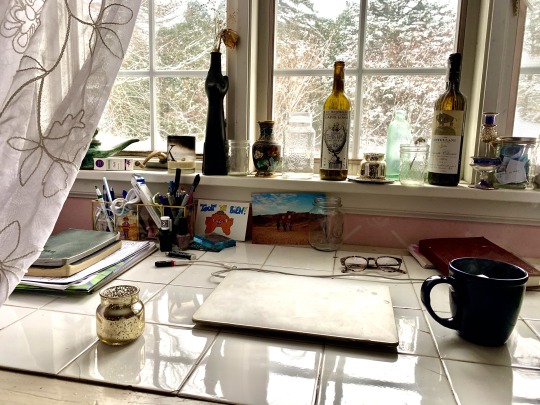
As 2020 wraps, I find myself increasingly absorbed by understanding the practices that I’m newly drawn to. The things I’ve chosen to connect with to get through what has certainly been the most unexpected year of my life, and perhaps that of billions of others. Even making such a grand statement still boggles my mind. Taking a moment to step outside of my life to acknowledge this global reality always gives much needed perspective. Life has been altered in wholly unforeseeable ways for billions of people this year.
Exactly how our lives and worlds have been reshaped certainly looks different for each and every one of us. Our realities are constructed by so much: where we live, who we live with, what we do each day, our job, or the roles we play in society as a whole. Every life looks different, but the pandemic’s impact on these answers (and many more) is ever-changing and harshly felt.
Reflecting on my own journey that has been navigating covid-19 and its impact on the world centers upon my age. Being 22 years old right now feels like constantly being stuck at a major life inflection point. In many ways I’m at the height of decision making- important ones at that, that will guide (the beginnings of) the rest of my life. Existential and perhaps a bit dramatic I know, but the pandemic exacerbates these emotions, so throw me a bone.
I spent the first 21 years of my life on a set path, a regulated track that unknowingly provided an absurd amount of comfort. I went to public school K-12, graduated high school, and attended a 4-year institution, long awaiting the fantastical graduation year that for so long existed as a far-off fantasy: 2020.
That momentous final semester was different than expected, but I can’t complain. I spent the last 3 months of college with a small handful of my closest friends, attended classes from the comfort of my bed, and graduated in my tiny apartment with two of my closest friends who hung around until the end.
I procrastinated packing and cleaning my apartment until the last possible moment as my disapproving landlord approached to conduct the final walkthrough. Unsurprisingly, I left with a fraction of the security deposit, and the hard learned lesson that expo marker writing does not always come out of refrigerators (as the All Purpose spray, Oxi-Clean, bleach, hot water, soap, and eventually, shamefully, white paint can attest).
With a egregiously packed car and zero rear view visibility, I was off. I blasted oldies with a twinge of liberation- I think I recall Born to Run (don’t worry, I am indeed embarrassed). I left all four windows down until I could no longer stand the sound of garbage bags flapping. Five short hours later I pulled into the driveway of my childhood home in Rochester, NY (with a broken mirror in the trunk no less- unsure if I’m superstitious but it felt like bad luck).
The latter half of 2020- from June until now, has been full of unknowns, decision making in the dark, and hard fought self motivation. Vivid mixes of emotions old and new.
First the dread of moving back in with parents as a young adult, and the stubborn resistance to fully unpack, so as to not get “too comfortable” at home. I now know such a thing is impossible for many reasons, one being that regardless of the lighting, art, and design, the girly pink walls of my childhood bedroom have proven immutable.
Following this initial shock were extreme levels of self-induced pressure to find a job, do nothing but apply to jobs, and then bask in dejected feelings of never being able to get a job. While in the process, fully isolating myself from others, because I simultaneously felt I had too much to do, but yet was never really doing a thing. That concept has been fun to sit with. It comes with the realization that the carefree bliss of not having a single thing to do- say for a month long winter break- is officially gone. The list of things you could (and probably should) be doing is endless- welcome to the real world, Kate!
August was a blessed, beautiful month that, at the risk of (again) sounding dramatic, I am eternally grateful for. During this sweltering month I lived out of a car for nearly 3 weeks, camping with two pals throughout Utah and Wyoming. Even hitting a deer at 9pm, in a no-cell service zone, in the middle of a State Forest in Wyoming was a welcomed adventure at this point. A broken transmission, impromptu camping, two-hour tow truck ride, countless insurance calls, hostile car dealership conversations, two rental cars later, and we were back on track. This (incomplete) list of challenges provided beautiful life experience however, imparting lessons I could never fully know until I lived them.
Returning home was as expected, a difficult transition back to monotony. Did I apply to vineyard jobs vaguely “out west?” Absolutely. Did I have it in me to go through with such a spontaneous life choice? Unfortunately not, though to my credit I did realize important goals that stood in the way of a dreamy vagabond existence.
The fall has been a blur, and now there’s snow on the ground. I’ve found myself living for the future, and rarely ever for the moment, which is entirely antithetical to my personal philosophy. I have proclaimed my personal soundtrack to 2020 to be the loop of traditional Lebanese music that plays on repeat at my job as a server at Sinbad’s Mediterranean Cuisine (now as a takeout extraordinaire. And yes, despite the lack of in-person customers we are indeed instructed to play the CDs as per usual). This work, or my role as a part-time nanny is far from fulfilling (though the kids are darn cute), but that’s not the point for now. “At least I’m saving!” has been my most reliable source of positive encouragement, nearing personal mantra.
I write this from my childhood bedroom, sitting at my desk, which was once our kitchen table circa 2002. It is as wobbly as it is sentimental, and I love it. The desk faces a window, the sill littered with glassware and candles because I have a thing against artificial light. I have a total of five notebooks, half opened, each containing swirling levels of thoughts, drawings, organization, calendars and to do lists. An orange caricature of a topless french woman sunbathing sits in front of me, reminding me that “TOUT VA BIEN!” (that everything is fine). And in minutes I will be dancing to the Moana soundtrack or drawing christmas trees and unicorns with 3 and 4 year olds. A snapshot of my life, at 22 years old, in 2020.
Despite my life not being what I expected, or what I wanted it to look like as I embark on what’s supposed to be the most adventurous, spontaneous, and simply well-lived decade of my life, it is what it is, and as the french lady says, everything is fine. I have two part-time jobs, unforeseen savings, quality family time (both for better and for worse), my mom’s cooking, and a roof over my head. In a world with inconceivably high death tolls, rising unemployment and homelessness rates, and the constant, precarious fear of general loss, I have infinite blessings to count.
Life does feel like a giant waiting game though. How can one strategically plan out what comes next in their individual life when the entire world remains a massive question mark? In a time when we feel trapped, impatiently waiting for opportunities, experiences, and adventures to reopen, waiting feels hopeless. Because it is. If you’re unhappy with the opportunities before you, create your own.
I’m not saying I’m doing a stellar job at this myself- and as you can see I certainly struggle with my fair share of existential pessimism (day in and day out). But doing things has a certain electrifying feel that ignites and empowers you to build a meaningful life. I’m producing a web series with a group of similarly listless 20 somethings who are also doing their best to be creative and productive from the confines of their family homes. I’m practicing yoga and meditation really to cope with my own stress and internal anxieties, but in doing so am creating new habits and mindsets that will certainly outlast the pandemic. I’ve connected with a group of strangers by dancing to shamantic and electronica music in various outdoor locations throughout Rochester. Whoa! Never would I have imagined finding such deeply liberating peace through ecstatic dance of all things, but hey 2020 is full of surprises.
This position I’m in is both uniquely my own through my personal experiences, and also shared by more people than I could imagine. Maybe only bits and pieces resonate with you, or maybe you are living your best life in the city of your dreams with a fabulous career in a lovely home with the world’s best roommates. But even if that’s you- you’re missing out on something too. The whole world is. We feel disconnected, disjointed, digitally controlled and consumed, and despite who we surround ourselves with- isolated. We’re stuck living in a world of “once this is over I’ll….” and no matter who you are it feels damn weird to spend so much time in your head dreaming of a future rather than living it out in the now.
So… solutions? As we all know, you only have so much control during a global pandemic (very little to be exact). But what you can control is how you live your life during it. I certainly won’t preach to what works and pretend like I’ve figured it out- that work is no one’s to do but your own. But I do feel that so much comes down to mindset, perspective, mental health and ultimately finding ways to seek inner peace.
Potential solutions are abundant, and have been explored by more people now than ever before. Though there is no recipe to conquer the inevitable fears, concerns and anxieties that accompany the pandemic and this phase of life, I’m interested in further exploring some of the ones that work for me. How is something as simple as breathing so helpful?
Finding inner peace is a sought after skill in 2020. I have endless gratitude to all of the incredible humans who have served as a source of learning, and have helped me to tap into positive internal energy. My intention is to look into some of the causes of (my personal) covid-realted inner turmoil and the solutions that have brought some serenity into my life. Though they may not always be long lasting, some answers are better than none. Here’s to writing for no one, and thank you for listening. <3
1 note
·
View note
Text
The Neverending Story
(Speaking of dark children's books...)
A couple of months ago, we watched the 1984 film adaptation of The Neverending Story, and it was bad and just made me desperately want to reread the book, so I did.
I first read the book when I was about eight years old, at the recommendation of my best friend; it was her favorite book. I can't even begin to describe how this book made me feel back then. It was the only time I remember where I stopped reading a book for a while (it was probably only a couple of days, but it felt longer) because I was genuinely afraid to see what would happen next. It's incredibly intense and bleak and terrifying and tackles mindscrewy existential themes, including humanity and losing one's humanity; there's a sense of imaginative whimsy to it too - arrays of quirky fantasy creatures and reality working by whimsical, arbitrary rules - but the atmosphere is one of looming, oppressive dread throughout.
The book opens with our protagonist, Bastian Balthazar Bux, about ten or twelve years old, fat and pasty-looking, running into a second-hand bookstore to hide from the kids who bully him at school. After a conversation with the store's proprietor, who hates kids and tells him frankly that he's a weakling and a coward for not standing up to his bullies, and a "failure all along the line" because he got held back at school last year, Bastian steals a book he's strangely captivated by, titled 'The Neverending Story'; he beats himself up about it, feels like he can never go back home now that he's a thief, and ends up taking the book to the school attic alone and starting to read it there.
We spend the first half of the book reading, along with Bastian, about the adventures of a 'Greenskin' boy named Atreyu, who is sent on a great quest to find a cure for the illness of the Childlike Empress, ruler of Fantastica, the world where the book takes place. Because of the Childlike Empress's illness, this beautiful land of fantasy and whimsy is slowly being consumed by an ever-expanding threat called 'the Nothing' - chunks of land simply vanish, leaving nothing behind but an emptiness that makes you feel as if you're blind, and creatures who get too close to large expanses of Nothing feel an uncontrollable compulsion to jump in and destroy themselves as well. Atreyu travels through a swamp that makes his horse depressed and causes him to stop and let himself sink and die; he speaks to a giant turtle, so ancient that she's completely indifferent to the fate of the world; he learns that he can only find his answers at the Southern Oracle, which is much too far away for him to ever get there in time; he lets a horrible bug hivemind monstrosity poison him because while having this poison pumping through your veins you can wish yourself somewhere else, and in his desperation he figures there's no other way to get there than to hope it’s telling the truth. He gets to know a gnome scientist studying the Southern Oracle, which is guarded by magical gates; the first either lets you through or freezes you on the spot to contemplate every riddle in the world until you die, depending on the whim of two statuesque sphinxes who seem to act entirely randomly, no more likely to let you through if you're a good person, or have a good reason to be there, than if you aren't and don't. There's a running theme of... let's call it a world that doesn't care. The Childlike Empress is explicitly without moral judgement: she loves all creatures of her domain equally, no matter how horrible. Atreyu is protected by her emblem (respected even by the cruelest of monsters specifically because the Empress respects them back) - but that doesn't protect his horse, or make Morla the Ancient One any more helpful, and the sphinxes just don't give a damn. Things in Fantastica are big and incomprehensible and cold and uncaring.
When Atreyu does make it through to the Southern Oracle, he learns that the Empress is dying because a human child from outside of Fantastica must give her a new name - and the Oracle is dying too, about to be lost to the Nothing, rendering all the scientist's tireless research pointless. With the help of Falkor the luckdragon (who was about to be eaten by the hivemind monstrosity, and no amount of pleading from Atreyu would stop it, except that Falkor then just happened to overhear the bit about the poison allowing him to wish himself somewhere else), Atreyu tries to find the borders of Fantastica; the four winds tell him there are no borders. He falls into the ocean and washes up on the shores of a city full of ghouls and monsters that's about to be swallowed up by the Nothing, the inhabitants forming a mad, suicidal procession to throw themselves into it, that Atreyu only barely resists. He finds a dying werewolf chained in a backyard, who tells him that the only way to the human world is to jump into the Nothing - where the inhabitants of Fantastica will be fuel for human lies and deceit. As the Nothing closes in, Atreyu is saved from its deadly pull only by the fact the werewolf clamped his jaws onto his foot as he choked and died, so that he's unable to jump into the void before Falkor finds him and saves him.
They return to the Childlike Empress crushed and defeated, and Atreyu reports that he failed on his quest - only for the Empress to explain that he has in fact brought a human child with him, who has been with him this whole time, and all he needs to do is give her a new name and say it out loud.
Bastian realizes in disbelief that they're talking about him! But he's afraid and embarrassed - if he were to show up there, being who he is, surely they'd think he's pathetic and a disappointment, no kind of hero. There's an extremely meta bit where, when Bastian doesn't say the name, the Childlike Empress sets out to find the Old Man of Wandering Mountain, who continually writes everything that happens in Fantastica - into a book called The Neverending Story, of course - and makes him read it out from the beginning, at which it of course turns out he's reading the actual Neverending Story book as it starts with Bastian bursting into that store, and they go through the whole book until again they reach the part where she tells the old man to read out the book, and he starts all over again in an endless vicious cycle... all the way until Bastian finally blurts out the name Moon Child, and suddenly he's in a soft, dark void with the Childlike Empress. She gives him AURYN, her emblem, which in addition to protecting him like it did Atreyu will also grant his wishes, and tells him to "Do what you wish".
...And from there, we move into a hair-raising deconstruction of wish-fulfillment fantasy. Bastian recreates Fantastica according to his own imagination - and also transforms himself into a handsome, athletic prince, and in the process forgets about ever having been ugly and weak. We follow him childishly wishing to be the best, strongest and most admired, meeting his heroes Atreyu and Falkor and hanging out with them - and then realizing Atreyu is a bit less impressed by his feats when he learns Bastian can wish for whatever he likes. He increasingly becomes preoccupied with being perceived as awesome and mighty, especially by Atreyu and Falkor, and his self-serving, ill-thought-out wishes begin to have less than pleasant consequences: he makes up a backstory for a city that immediately turns out to be true, involving the ugliest creatures in Fantastica, Acharis, who spend all their days crying but create beautiful delicate silver filigree structures... but later he meets them, and feels sorry for them in their constant misery and wants to be seen as their great kind benefactor, so he wishes for them to turn into lighthearted, ever-laughing butterflies... which they do, only the butterflies are horrifically obnoxious, casually destroy the Acharis' silver creations, and in the end are left bored and unhappy. In a grand tournament he wipes the floor with a knight who had been head over heels in love with a princess who doesn't want him now that it's clear he was only second best, leaving Bastian sort of responsible for his misery... so in order to solve the problem he wishes into existence a horrific dragon who kidnaps the princess, so that the knight can go and rescue her, and as they walk on they see signs of all the destruction and horror caused by this dragon (who, once he wishes it, has always existed).
Meanwhile, Atreyu and Falkor start to grow concerned, especially when it becomes clear that Bastian loses some of his human memories every time that he makes a wish, slowly shaving off pieces of himself - and those tend to be exactly the pieces that made him who he was, human and sympathetic and kind. But when they bring it up with Bastian, he becomes angry and upset - he's so caught up in his power fantasy that the idea of giving up AURYN and the power of wishes feels like an attack on him. He wishes into existence an evil sorceress who kidnaps and tortures some of his friends, just so that he can rescue them and singlehandedly take down her army of hollow suits of armor; she theatrically repents and offers to be his slave, and because she flatters his ego he lets her join him, and snaps at Atreyu for pointing out the obvious signs that she's manipulating him and he's walked right into it, because he can't let Atreyu win, he needs to prove that he's right and no one will stand against him and even this sorceress fears and bows down to him.
Eventually Bastian stops wanting to ever go home at all, Atreyu and Falkor try to steal AURYN as a last resort and Bastian banishes them, and Bastian tries to crown himself the new Emperor of Fantastica, stopped only by Atreyu leading a literal army against him and a bloody battle where at the end he rides away swearing to take revenge on Atreyu and Falkor...
...and that's when he happens upon the City of Old Emperors, full of humans just like him, who had once come to Fantastica, gone on their own power-fantasy wish-fulfillment sprees, and crowned themselves emperors, or tried to. In the process, they had lost the last shreds of their human memories and become completely self-absorbed, uncommunicative, unmotivated husks, reduced to performing pointless repetitive actions or mindlessly playing the monkeys-with-typewriters game for centuries or millennia. (And this does shock him out of it, and his remaining wishes go into grasping to heal and recover his humanity with the little he has left.)
When I was a kid I didn't fully get it. Today, rereading it, it's achingly clear to me how Bastian's wishes are self-absorbed from the start, stemming from a bullied child with a poor self-esteem's desperate desire to be someone, be able to do anything and be respected and admired and even feared by everyone, immune not only to jeers and taunts but to all criticism. But when I was a kid it didn't feel that way. Bastian was established throughout the first half as really normal and sympathetic and I rooted for him, and him getting to be cool and handsome and the best at everything was awesome and satisfying. Only then it just started to go wrong, in some horrible, insidious way, and watching this character I'd cared about and identified with slowly turn into a monster was more unsettling than any of what Atreyu had encountered in the first half. I think the point where I had to stop reading for a bit was when he shouted at Atreyu and Falkor for questioning his decision to bring the sorceress into the fold, and the chapter ends with saying that was when he forgot about ever being a child in the human world. I wasn't afraid of the sorceress, I was afraid of what was happening to Bastian and where this horrible evolution was headed. At eight, I sure hadn't read anything like it, and even now at almost thirty, I still can't really think of any other fiction that makes me feel quite the same way. (Though maybe one day I'll reread and ramble about Momo, Ende's other long famous serious children's book, which I actually considered my favorite over The Neverending Story as a child.)
(Today, I do notice amusedly that oh, hey, my more recent favorite work of fiction also involves an initially sympathetic main character slowly transforming into a monster.)
The 1984 movie very obviously only gets the book on the most shallow level: it's apparent that they liked the meta twist and thought it was clever, but the rest of the main themes just clearly went way over the heads of everyone involved. It essentially takes just the first half of the book, the Atreyu-centered portion, and tries to make a fun fantasy adventure out of it, playing up the quirky whimsy with big puppets and significantly toning down the soulcrushing atmosphere that actually defines the book. Artax the horse dies, sure (though they made him nonverbal so he just kind of stops and stands there as he slowly sinks), and Gmork the wolf is there, and there's an actually fairly emotional added scene about the messengers from the opening of the book - but meanwhile Morla is comically sneezing constantly, there's triumphant heroic music, the Nothing is just some roiling clouds, and of course we spend some time on look how fun it is to fly on Falkor. None of the elements that are there are actually very interesting or unique the way they're presented in the film; it just feels pretty generic and kludgy. Leaving out the second half misses that Bastian isn't just a cool meta framing device for Atreyu's adventures; he really is the main character, and his journey is the more important one. And then the end... Bastian wishing to fly Falkor over to the real world and chase his bullies down into the garbage is presented as a happy triumphant ending, and this is just the very antithesis of the book's central thesis.
All in all, I really cringe to think that this is all most international audiences know of this story: a kind of generic, clumsy 80s fantasy except the kid reading the book is the one who saves the world in the story. There is so much more to the book than that, but based on the film I never would've given the book a chance. If that's you, please reconsider. It's a really good book and the film is a travesty of an adaptation. I rather hope that now in the golden age of TV somebody will eventually do it justice in some kind of miniseries - I doubt you could fit both halves into a movie without making one or the other come out rushed, but the story really deserves to be introduced to a wider audience in its proper form.
#the neverending story#review#ramble#adaptations#children's fiction#bastian balthazar bux#character analysis#okay that's one down from the post backlog
19 notes
·
View notes
Text
People don’t like season 2, and here’s what they have to say :
tl;dr: I answer the web’s most vehement complaints about season 2 of American Gods. If you happen to recognize yourself in one of those, then I suggest thinking about it really really hard and, perhaps, giving the show another chance. If you recognize yourself in several of those, please drop the show. It’s not worth wasting your time and especially not ours. (I put a list of helpful cast and production related facts at the end.)
Hi, Nelle here, I’m but a humble fan who wishes to have fun seeing gods bicker and argue among mortals, complete with the craziest of situations, stellar cast and great visuals. And yet I can’t help but hear things when I start browsing this hellsite in quest of juicy fanworks.
Although I’m no Joan Of Arc, I hear voices from above and here’s what I have to shout back (lest I get burned at the stake) :
“The pacing is all over the place ! It’s too slow !”
Is it tho ? Pacing has been “all over the place” (really meaning: different from what we avid show-viewers are accustomed to) since season 1, we’ve never gotten straight answers out of anything unless we started listening and paying attention to details.
The book (you know, the source material) has four parts, the fourth serving as an epilogue to the whole story, season 2 is most definitely meant to close part 1 which, allegedly, had the slowest of pace to begin with. And it doesn’t even have half the new narratives the show has been creating. So no, it’s not slow. I promise you things are happening.
“It needs to follow the actual book more !!”
What’s a good adaptation ? Is it something that is 100% truthful to the source, down to every word ? Is it something that should offer something for people who don’t know the source ? Or, on the contrary, be something inseparable from it ?
American Gods as a TV show offers new things for people who have read the book and for those who haven’t, while keeping the beloved moments and aspects from the original material.
Why add or change stuff ? Well because, if you’re a book reader, you get welcomed into the state of existential dread that comes with not knowing what happen next, I promise it’s part of the fun. But also because author Neil Gaiman believes that he can do more, do better, with something that was written 20 years ago and needed the changes in a lot of places. He’s aware that he has, in fact, a show to make, and not a carbon copy of the book, as well as a fanbase that deserves to be challenged and entertained.
“Why taking the focus off Shadow ? He’s barely the protagonist anymore !”
Because there are..... characters ? who are also part of the story ? Like, actual stories need characters ? But alright, I know it can get confusing when you have a lot of those, here’s how you can still tell Shadow is the protagonist : months of advertising and the entirety of season 1 which was spent following Shadow with only minor breaks allowing other characters to breathe. Trust me they need the development too, or then we’ll really have reasons to complain.
You want a narrative focusing solely on staying in Shadow’s head ? Alright. Try the book. But here’s my take on its narrating choice, as a graduate in english literature : it’s boring. To the point where Neil Gaiman himself got sad that he couldn’t follow other characters.
“They’re not giving the POCs enough space ! Where are the coming to america segments ? At least they gave actual insights.”
Out of every piece of fiction, I truly don’t think you want to get angry at American Gods for how much room it’s giving POCs... (a 20% white cast ensemble, POCs and especially WOCs writers and directors on production, ethnically accurate casting and writing, diversity positive messages, etc) Really I’m sure there are many other places in the fictional industry were the question of diversity is more than legitimate. American Gods has yet to be one of them, by far.
As for the Coming To America stuff, well, there’s not that many in the book to begin with. There are a whole bunch for sure, but we’ve got over quite a few of them in season 1. If there’s more believers you want, we’re served with the latest episode 4, with humans worshiping both Old and New, and interacting with gods. I’m sure we can review that point again once the season is over.
“Those white directors don’t even know how to read or write POC characters !”
*cough*
here’s a list of the POC directors and writers on episodes 2 to 5 of season 2 only :
Deborah Chow (director)
Aditi Kapil (writer)
Salli Richardson (director)
Rodney Barnes (writer)
Orlando Jones (writer)
That’s half the entire director-writer team for these episodes, with Neil Gaiman being involved. You’ll have to point out to me exactly what you mean by “not writing right”.
“New Media ? 1. she’s a bitch, 2. her actress is just plain bad, 3. she’s a hurtful stereotype.”
And here comes perhaps the trickiest one of all... I’m gonna have to bear with you, as much as you’re gonna have to bear with me :
1. Yes.
2. No.
3. Yes, and it’s a problem, but not for the reasons you think.
First of all, and let’s get it out of the way : actor =/= character nor writing. You think the writing is bad and/or that the character is annoying ? Well, it’s certainly not on the actor. You wanna know the actual level of Kahyun Kim’s acting ? Starring in an Alan Cummings play alongside him. We’ve got a lot to discuss but please keep her out of this.
Second, New Media is an absolute bitch of a character. She’s mocking, manipulative, and too ambitious for anyone’s good. A lot of people seem to love her tho and to that I say good ??? I mean, great if you like her, because she’s got as much potential as the rest of these crazy characters, I’m not here to tell you who you should hate and who you should love.
But there’s a problem you shouldn’t ignore, and that its so far she’s not well written. It’s a terrible thing to say in such a show but she’s really not : because we barely see her talking, because we barely got any scene with her (remember what I said about letting character breathe ?), and because what we’ve seen of her so far is the stereotype of the hypersexualized naive asian girl. Complete with tentacle porn scene. (Whether you felt weirded out, amused or utterly disgusted by this is your own valid opinion.)
The character has been officially described as “the goddess of global content”, “a cyberspace chameleon” and “a master of manipulation.” In recent addition to that, actor Bruce Langley (Technical Boy) has said : “New Media’s willing to be perceived as naive because if she’s being underestimated, when she does make her move, you’d never see it coming, but she knows way more than she lets on.” He then goes on to compare her to Gillian Anderson’s Media.
This proves that the way New Media comes off isn’t a problem of intent (the naive part is calculated and they want the character to be duplicitous, falsely seductive), but of handling, and it’s just as bad. Sure, Gillian’s Media also knew more than she let on for about as much screen time -I’m sure New Media will get to her four scenes in one season-, but she had been grounded in the narrative as her own character, she’s had her exposition speech and time. (See her meeting with Shadow in S01E02) We’ve yet to see that much of Kahyun’s New Media.
Because they do not give her what she needs to be more than a two dimensional character, we find ourselves with a shallow character who doesn’t give too many signs of the thought process everyone seemed to have put into crafting her beforehand, including Kahyun’s acting. This is a serious issue that needs to be handled before the season ends, or she will just stand out like a nasty spot in an overall incredible piece of fiction. Hell even Laura (another very unlikable character) manages to be a great addition to the narrative. Come on people.
You can of course argue that they could have gone for another type or personality for her, other than naive and sex-oriented, for a korean actress to play. You’re right, there’s a lot of aspect of social media that could have been put to work, but not only are we gonna need more than two scenes (at least the tentacles aren’t a regular occurrence so far), but it’s just like they could have not made the Technical Boy hang Shadow.
The New Gods appear as the ‘general bad idea’ we promote through and associate with their element. Mr. World is gonna be the creepy looking government dude, Tech is gonna be the lanky rude geek, they’re gonna be cold, insensitive and selfish. They’re gonna be the things we don’t like. Throughout season 1, Tech Boy was in the same place we find ourselves in with New Media : he was the loud white racist teenager hating on anon on the net, he was unlikable from start to finish, and it’s only once we got inputs from his actor, the writers, and then now that they’re showing more of his story and personality well after season 1 that we see him as the fully complex and interesting character he is.
Let’s all keep our wits about us, not engulf ourselves in blind hate or love, and encourage the writers to prove us all that this character is worth the while like her actress says.
(I still won’t forgive the bitch, but at least she won’t stick out like a sore thumb.)
(if you want Kahyun’s input on her character and experience, here’s a lengthy interview)
"They don't even know how to write their own character, period !"
By all means, tell me your basis of characterization to declare that characters who didn’t even have enough screentime to have much substance in season 1 (except Shadow, but strangely no one complains about him) aren’t written right when their creator is literally hovering over the writers and actors shoulders, because he wants them to be developed and written right.
It’s not Harry Potter, Neil isn’t making up facts about them to make himself look better, maybe accept that the vision you had in your mind wasn’t entirely accurate to the truth of the characters and that’s okay ? You can still write them yourself however you want, tell the stories you want to tell, Neil has made it very clear that he doesn’t consider fan ideas less valuable than his.
“Bryan has such as specific, unique vision ! They’re just trying to copy it and they’re failing.”
Definitely. No really, you’re right, I’m a big fan of Bryan’s work, I lost my mind like everyone else when he said he wasn’t giving up on Hannibal season 4.
But you know who else has a unique vision ? The seven directors who took over (four of those are women) and the show-runner who had already worked with him beforehand. They’re not trying to copy his style, they’re trying to make a smooth transition so fans like you don’t have a hard time mourning the terrible loss of Bryan and Michael. And for every person who noticed the changes, there were just as many who haven’t even paid attention to it.
Concept : some people may watch shows/movies for the story and the characters, not just for who’s behind the camera. (As far as I’m concerned, I actually like the image better. Everything was killer in season 1, and I think it’s even nicer in season 2.)
“Bryan gave us Salim and the Jinn, and now they’re just gonna be cast aside because those directors lack the LGBT+ sensibility Bryan has !”
Alright, yup, sure. As a member of the community myself, I totally recognize that someone who’s also part of it will know firsthand of the subtleties and details to give the best representation possible on screen. The example of Salim and the Jinn is perfectly fine, since the entire segment was indeed beautifully made. But if we cannot allow people from outside to ponder and think about our lives through writing (which is probably the best way for them to start understanding and broadening their mindset), how can we expect wide representation to improve in any meaningful way ? Especially considering that the show has been casting LGBT+ actors, in an environment where the cast is listened to and solicited on their opinions.
And especially when Bryan was not the one who gave you Salim and the Jinn. (Because I’ve seen people genuinely believe it.) Neil Gaiman did. He wrote a gay muslim couple in his book 20 years ago, way before it was considered a political statement. He’s also the one who gave strict and specific directions as to how these very characters should be handled. Because if he expanded Salim and his fire boyfriend Jinn’s story from a one-shot to a full story integrated into his entire narration, then it’s certainly not to pull a “bury your gays” or make them miserable. No need to be LGBT+ to be a decent writer and human being.
“Production was a mess anyway, I knew it’d turn out like this. It sucks without Bryan.”
Define “mess”. Because all the incendiary reports we got throughout early production had been utter bullshit.
Showrunners being “fired” ? Bullshit. “Disastrous” organization ? Bullshit. “Screaming matches” between directors and actors ? Bullshit. Actors “refusing” to come back ? Bullshit.
Every report that wasn’t made through direct input of the cast or production team was not only wildly exaggerated, but also fake ? But please, hear it from Neil himself :
It was weirder for me to read some of the stuff online that said, “Oh, my god, American Gods, behind the scenes, is all falling apart.” I was going, “But they just shot four episodes, and everything is fine. They’re doing some re-shoots, but they’re doing less re-shoots than they did in Season 1.” [...]
I was reading Steven Bochco’s biography on the tube, going into work on Good Omens, every morning, and learning about what went down on Hill Street Blues, and then on NYPD Blue. That was worse, by a factor of thousands, than anything that happened on American Gods. A showrunner came, and a showrunner left. That’s not even an unusual thing. [...] The weirdest thing for me was putting out a thing on Twitter on Season 2, and having a bunch of people go, “We thought this was canceled.” No, it’s not canceled. In its own mad way, it’s on schedule.
(Source)
The show was never in any danger, much less in jeopardy. It's overreactions to false rumors and dramatic assumptions that can kill a show faster than a showrunner leaving. You want to be critical of a production ? Go ahead, and check your sources and facts. Please. I promise most of the time it’s not worth the worry, much less losing all hope.
“Bryan cared, they’re just ruining what he’s built.”
I dare you to watch any cast interview and tell me these people don’t care about the show, and that they do not value the work everyone else (from hair department to makeup artists, producers, writers, directors and costume team) puts into it as well.
I’ve watched my fair share of shows, I’m curious about production and behind-the-scenes material in general, and I’ve never seen a group of people being so genuinely happy and passionate about what they do and create together.
Neil took time out of preparing Good Omens (which he was showrunning himself) to be more active because he knew things would be different between season 1 and 2. Ricky Whittle (Shadow) had his contract reviewed to better accommodate shooting and planning. Orlando Jones (Nancy) contributed to writing episodes (especially regarding Black history and representation) and brought inputs on characterization. Ian Mcshane (Mr. Wednesday) participated in directing when he explicitly said during season 1 that he wasn’t interested in working as a director on this kind of show.
And that’s for the well-known names only. Go on the American Gods hashtag on instagram, you’ll find all the various artists who participated in crafting all the details found in new episodes. They’re out there talking about how excited they were to work on it all, how they did it, the love they have for the show and crew. They’re active and positive in every way you can be, please tell me how much they don’t care.
Production made the choice of taking its time making this season rather than rushing it when it’s been very clear that delaying can cause massive loss of viewers, because they care more about how the show comes out than what people actually think. They took in stride whatever problem a show of this magnitude could naturally encounter (again guys, no disaster happened) and worked to solve it the best way they could because they were perfectly aware that we fans care. And somehow that’s what made some of yall disappointed ??
If you seriously think Bryan (and Michael, some people forget about him smh) cared more about American Gods than these people -when he, in fact, cared just as much-, then by all means, leave right with him.
(Also uhm, idk if you noticed, but they’re both still credited in the fucking opening. Because, you know, they’re going by the bases they’ve settled.)
Some (hopefully) helpful facts :
+ Bryan and Michael weren’t fired, they walked out of the show after mutual understanding with the rest of the production that they weren’t agreeing on budget and realization. They concluded that pushing it would just be harmful to the show.
+ Likewise, Jesse Alexander (second showrunner) wasn’t evicted but stepped out once disagreements rose as to how to handle the end of the season. Again, they found a solution fairly quickly.
+ Gillian Anderson had only signed for season 1. Whether her character will ever be seen again (probably in flashbacks) is entirely up in the air. No promises, no impossibilities.
+ Both Kristin Chenoweth (Ostara) and Chris Obi (Anubis) have not been able to contribute to season 2 due to conflicts in their schedules.
+ Neil Gaiman has been much more involved in the production of season 2 as he had finished shooting Good Omens, something which took up most of his time when season 1 was produced.
+ Taking time producing a show =/= production being a disaster.
+ Always go for the reports/articles involving interviews and/or inputs of the persons actually working on the project (cast members, producers, writers, directors). Those are the most reliable sources you can fight. (Just remember that there’s always a possibility for fake news/drama online !)
#please do message me if you want clarification/to discuss#summary + facts in the tl;dr and at the very end#american gods#starz#freemantle media#american gods season 2#neil gaiman#bryan fuller#michael green#ricky whittle#new media#gillian anderson#kahyun kim#rant#my writing#bitch this is so long
14 notes
·
View notes
Photo

The World Says Your Job Sucks. Even If You Love It.
The world is changing. Fast. Conservatives, liberals and their political gladiators squabble over those changes. Free healthcare (or not), "women's right to choose" (or not), Citizens United and living wage jobs are the spoils. The future is side wants is the prize.
Each side's political leaders persuade their supporters promising "Jobs for all", and "rebuilding the middle class", and "Protecting existing jobs from competition". Or "raising minimum wage standards for low-skilled jobs". To me, these are synonymous with jail sentences.
That’s right. I’m talking about your job. Whether you like it or not, the world would prefer its absence. Like that guy you can’t stand being around, your job is not only annoying. It’s probably killing you.
Why aren't politicians promising to end the need to work "jobs" at all? Do they (and the rest of America) not see how much better life would be without them? I do.
I'm not alone.
A small Faction advocates ending, not jobs, but all kinds of "working". Once and maybe still considered fringe, that may change given the future we face.
Advances in Artificial Intelligence and automation are already having their way across many job sectors. That's increasing. When companies like Pepsi say they are aggressively pursuing automation, and trucking companies see billions of savingsin self-driving trucks, you can bet, the workday's days are numbered. Meaning, jobs are on their way out.
Instead of fighting the inevitable, we could analyze if jobs are essential or not. And if not, what could be better than people working jobs.
Faction members say jobs are neither essential nor valuable.
But mainstream America still sees benefit from them. Despite their problems and obvious downsides. Downsides most people know. Downsides I'll share in links below.
Post Industrial Revolution Jobs Are Soul Crushing
This Faction, of which I am a part, says jobs crush souls. They're divisive, making competitors of your fellow humans. They make people sick. They waste lives in return for a paycheck.
People on their deathbed agree with me.

^^ What many who died regretted about life while dying. Read the whole article here.
Sure, some love their jobs. But they are the minority. Thirteen percent of people like going to work worldwide. Many of those have adapted to their jobs. Meaning, they tolerate it. They don't really like it. How do I know? Offer them $10 million. See if they'd keep doing what they do for "work”.
Job lovers used to be the majority. But it wasn't jobs people worked back then. Before the the industrial revolution and mass production, people specialized. Not the specialization we see today. Where one person does one thing contributing to a assembly-line like production process.
They specialized around things they were passionate about and thus experts at. Or they had the aptitude (the natural talent, i.e. passion) to become good at it. They took pride in their work. And their output reflected that. That's why some of their output is still going strong hundreds of years later. In architecture, machinery, hardware and more, their work is their legacy.
Today, not so much.
I believe even if you love your job, you'd gladly give it up were a viable, engaging option available (and there are). Something more compelling that doing what you do. What compels most to work is need. They need things working gives them.
But work isn't the only way to get those.
Nearly all people give up working in the end. We call it "retirement".
Some give it up when a miracle happens: like winning the lottery. Or tragedy: a crippling injury or near-death experience.
So what should humans do with this thing most of us don't want to do?
The Faction says humanity should support people following their passions. The pursuit of leisure, and Maslow's idea of "self-actualization” should our focus. These pursuits not only vastly enrich humanity as a whole and the individual too. They also can solve all our pressing global, societal and environmental problems. But first, we as a civilization must organize said civilization away from "the daily grind".
That is possible.
Besides, it's passionate people who create humanity's breakthrough solutions. Not the ones complaining about what they do for a living. Imagine what could happen if everyone were passionate about what they're doing. Rather than flipping burgers, crunching numbers, and working in rendering plants. Unless those things are your passion.

^^Photo: Photo: Wahyu Setiawan on Unsplash
Jobs keep people so busy, affording enough time and energy to complain about problems. With more free time, people could be solving more problems they see. Create fewer problems too.
Jobs As A Belief Habit
Believing jobs are what people really want is a hard habit to break. For some, breaking the habit causes an existential crisis.

^^Someone indoctrinated to the “need” of jobs. Is it common sense? It is common. Sensical? I don’t think so.
But generally, satisfaction people get from workingcan be had (in greater levels) through passions. There's nothing a job provides that a passion can't in the right context.
People prefer not going to work. It's obvious when you listen to how people talk about work at work.
On Monday, people are trying to get over the end of the weekend. Why do weekends go by so quick? No one ever said "Thank God, it's Monday!"
By Tuesday they're hoping Wednesday (hump day) comes quicker than it feels like it's coming.
By Wednesday, people already are talking about being on the week's downslope.
Come Thursday, they breathe a sigh of relief: just 24 more hours before "TGIF"!
When Friday does come, people are excited. No, not about what they're doing. About what they're going to do come evening and on the weekend.
On Saturday, they're happy. But then...
On Sunday there's the general agreement that Monday looms and everyone's got to go back to work. Reluctantly.
I know this because I felt this way. I'm sure the stats don't over exaggerate the crowd I belonged to when I worked a job.
Work as it is construed today is not what humans are meant to do. I mean, we are doing them, so I guess we're meant to. For now. But jobs are catalysts. Jobs sometimes offer so much negative stress they propel people in the direction of their passions. Some do that. I'm one of them. Many others tolerate the stress instead.
Today, thanks in great measure to my wife, I'm following my passions. But I'm not unique. Every human being has a passion. That's what you're here for. Not work a job you don't like, tolerate, or become acclimated to.
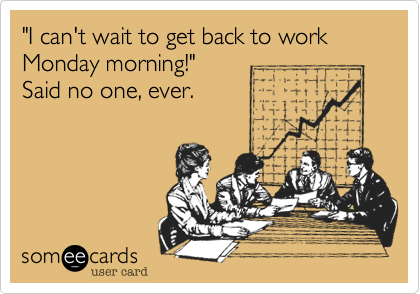
^^Seriously.
The Transformational Power Of Passionate People
Ever notice that people following their passions are, well, passionate? They're not working. They're not watching the clock. They're not dreading Monday, or any other day of the week. They're enriched. They're in the flow. They're engaged. For them, time flies. Where did the time go? They ask!
People following their passion also produce excellent output. In many, many cases, that output inspires people. A lot of people. Even the strangest passion fulfills the actor and benefits the world. Including this guy,who eventually became a millionaire and was Knighted by England. For what? Creating the strangest art I've ever seen, or not seen:
youtube
Many passionate people are millionaires, world changers, leaders or all of these. Some are so humble and their work so obscure, you don't know them. Like Snowflake Bentley, whose passion changed our view of snow. No, not Jon Snow from Game of Thrones, the weather phenomena:
youtube
Someone following their passion views the week much different than a working person. Passionate people have six Saturdays and a Sunday in their week. Not the Monday-to-Friday working stiff drudgery. The rest of their lives are unlike most of us too.
What would it be like to have every American following their passion instead of working for a living? That's the question I asked at Copiosis six years ago.
Today Copiosis still going strong, promoting a better system than what we've got today. One that can easily allow every American...every human...to follow their passion.
Imagine how much better the world would be. How many better products we'd have. How many millions of passionate people we'd have. And a more healthy world we'd be living in.
A utopian fantasy? Some are beginning to say such "fantasies" are sorely needed. The faction I belong to believes this. Given the shape of our world these days and where it looks like it's going.
The Future Is Not Work. Nor Jobs.
The future is here. It emerges from the present. In this emerging future there are no jobs. Humans don't need to prepare for it like some cataclysmic apocalypse. Instead, we could be rushing head long towards it. As though it holds all our answers. Which it does.
Universal Basic Income, aka Andrew Yang's "Freedom Dividend"is a nice interim measure. It will help with humanity's thumb-twiddling. We still hold on to the past as though it's the present. Even though our entire planet is showing us our old ways are destroying us. The planet too. A Freedom Dividend can help us “bridge" here, where jobs dominate, and “there", where they've become mostly extinct.

^^A UBI could be a great bridge to a great future.
It could be a great catalyst. What could it catalyze? A great leap forward. Into what?
A future where you'll be inspired, rich and passionate about what you're doing. Because what you're doing aligns with who and what you are.
That's a future I'd say anyone would want. Unless you're still stuck in that habitual thought that "people need jobs.”
They don’t. And the future agrees with me.
#copiosis#america#amerika#american exceptionalism#make america great again?#math#yang gang#Andrew Yang#Alexandria Ocasio-Cortez#bernie sanders#democracy#democratic socialism#democratic national committee#Democracy Now!#socialism#socialist#co#communism#capitalism is evil#capitalism is violence#capitalism is killing me#capitalism is hell
0 notes
Text
Double Dee Weekend Analysis Challenge
This weekend, for Double Dee Appreciation Month, a bunch of EEnE blogs have been asked by @eene-fangirl to analyze the climactic swamp scene from Ed, Edd n Eddy’s Big Picture Show. In this scene, Eddy tricks Edd into believing Edd has allowed Ed and Eddy to drown in quicksand. This leaves Edd alone with the audience for about a minute, attempting to rescue them and then sobbing over survivor’s guilt. If you’re ready to deal with that, keep reading!
If you’re interested in how my opinion of this scene has evolved, here’s another analysis of it from a few years ago. Hopefully I don’t repeat myself too much, I only gave myself a moment to gloss over it before I started this: http://book-o-scams.tumblr.com/post/128634520423/do-you-think-you-could-do-a-review-about-the
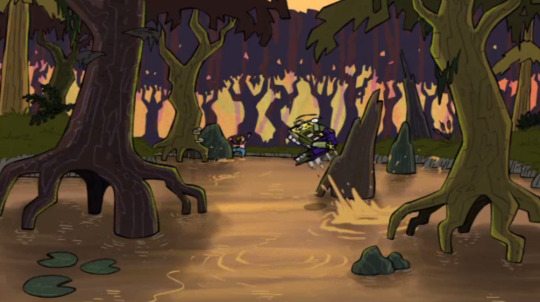
What if the last time you saw your best friends safe and happy before their tragic deaths, one of them was pretending to be an alligator-skin bag and the other was running away from him in half naked mock-terror? This is Edd’s lot in life.
To be serious, I want to take a moment to say this swamp is beautifully designed. The water is so much more detailed and colorful than the flat colors on the animated water we usually see, and the silhouette trees exist in a really surreal season 1-inspired style that I can’t put into words. What are those stripes on the trees meant to be? Just weird lighting? Fumes?
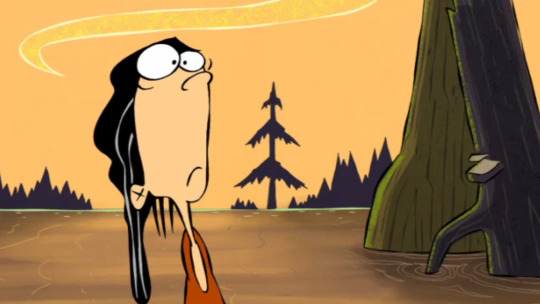
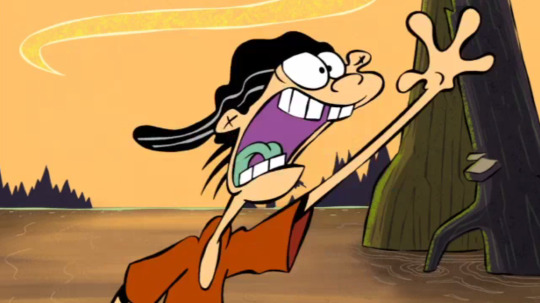
“WAIT!” Love this little hand gesture.
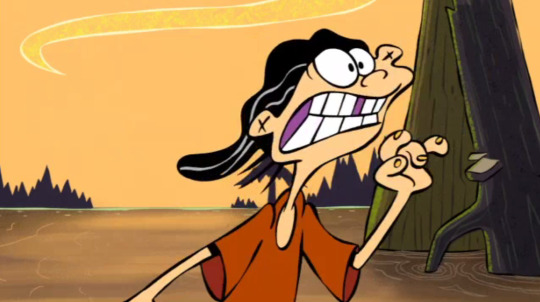
I always wonder if Eddy was already planning the prank when he led Ed away. It IMMEDIATELY upsets Edd that Eddy is out of view. Eddy’s prank seems like it could be a response to the argument Edd and Eddy were having prior to this scene about why Edd ISN’T on this road trip (”to impress your brother”).
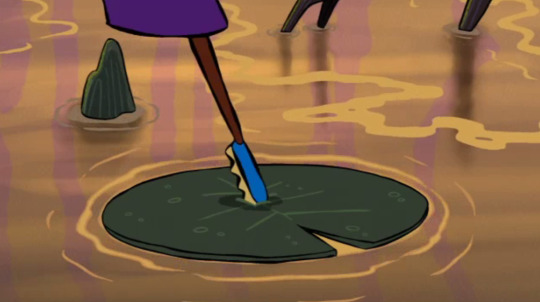
Graceful Swamp Nymph Edd over here....
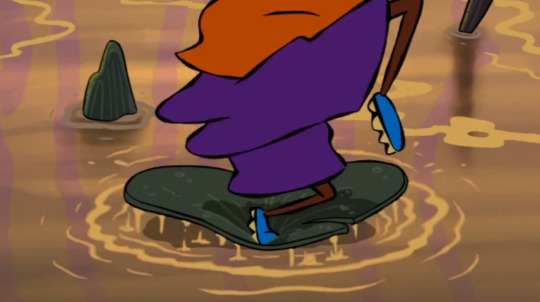

Whoa
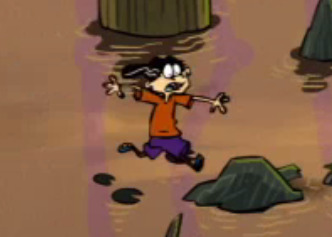
How did he land that jump!?
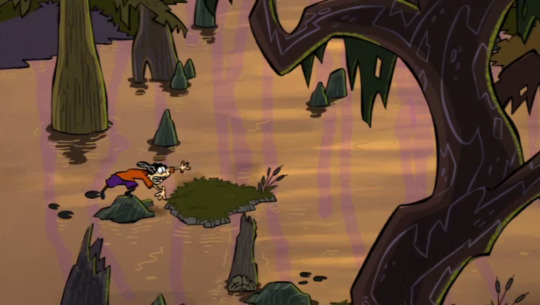
This whole shot is great.
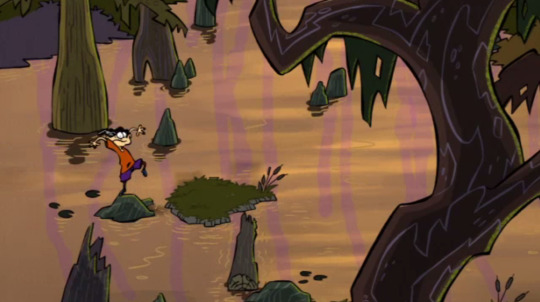
As much as I would love to watch close-ups of Edd slipping all over these platforms, the crane shot communicates the loneliness of the moment, the distance between Edd and his friends, the dread that makes Ed n Eddy’s deaths seem like a possibility, and all while giving us a moment to appreciate the background art.

The decaying stagnant location could probably be taken as a metaphor for the state of the Eds’ friendship...
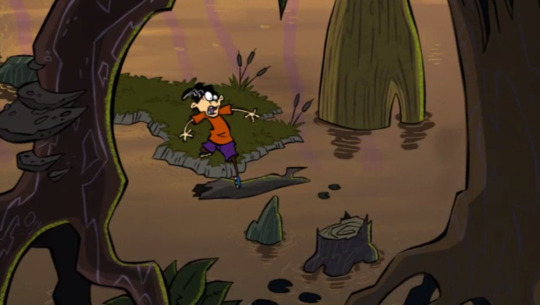
The small drawings are a little sloppy, but kinda charming. They remind me of the EEnE comics that weren’t drawn by AKA artists.

This moment of isolation also feels like a parallel to shots from the previous prank in the movie....
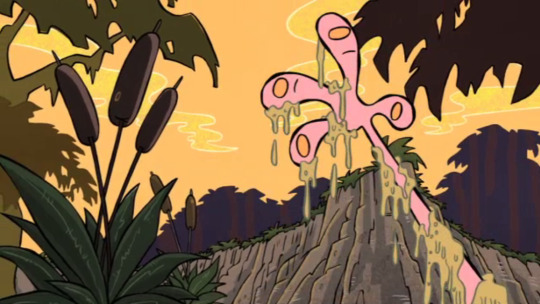
I love the subtle extra detail in Eddy’s hand, and the grime is good and creepy.
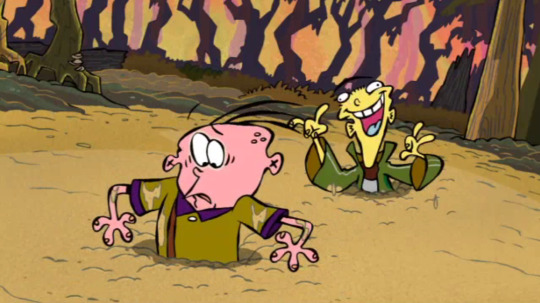
Maybe it’s just because lately I’ve been listening to the music I listened to backwhen BPS came out in 2009, but I feel like there’s a metaphor for Edd’s friendship with Eddy and Ed behind this whole “quicksand” visual hook. I’ll let you psychoanalyze that yourselves, but here’s a song about quicksand to help you think:
https://www.youtube.com/watch?v=Zo50Wv2A4uk
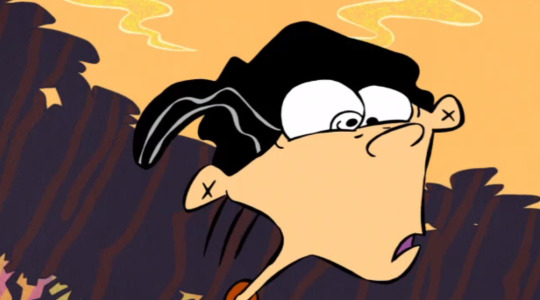
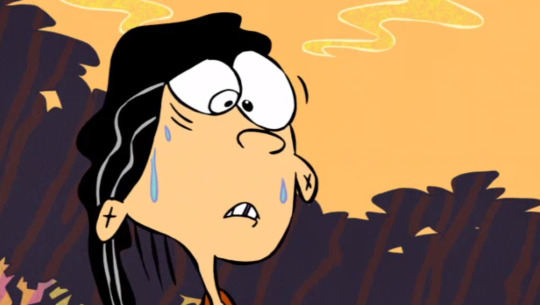
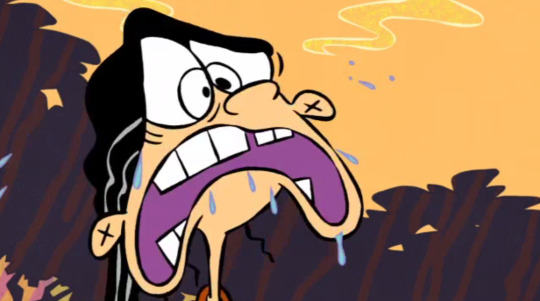
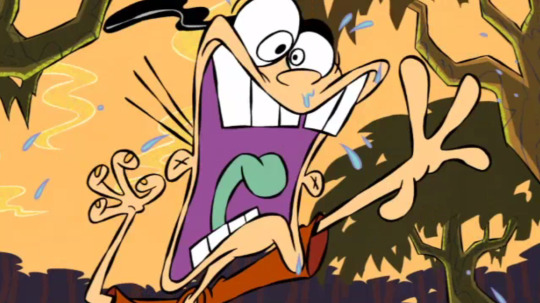
Gotta love that escalation from whispering to panicking! In my previous analysis of this scene, I believe I considered the possibility that Eddy fell in this muck by accident and just ran with Edd’s suggestion that it was quicksand. On the other hand, it’s pretty suspicious that Eddy ran off shirtless and then got dressed before jumping in here... I think Eddy really does just know how to fake his own ignorance and predict Edd’s phobias.
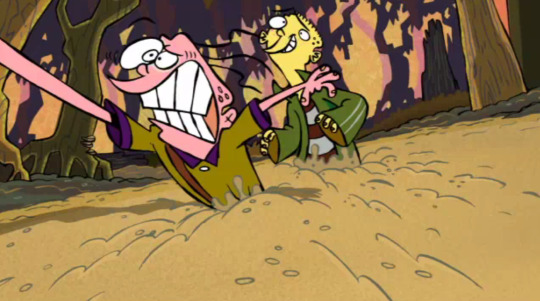
I mean look at Ed in the very next shot! He’s not even trying to make this convincing. Very good dramatic touch on Eddy’s part to reach out for Edd, though.

I know I’m supposed to be analyzing Edd but I’m always taken by Eddy’s acting during these pranks. In the Gag Factory, he just goes for horror movie shock value, but here it becomes clear that Eddy has thought through the dramatic potential of his own death. Look at this pageantry!
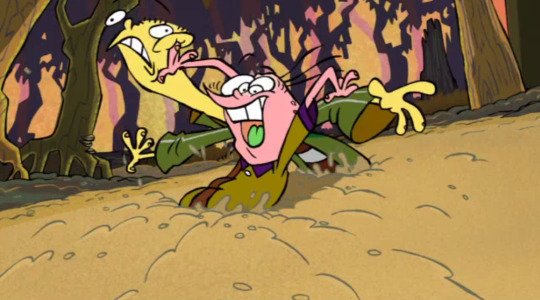
Ed’s comments, “In Manure” vs “Immature” and “to all the girls I’ve loved before,” also suggest the scriptedness of this prank.

But at least Ed’s choking here sounds genuine enough to make his other banter more believably sad that he’s going out with jokes.

More staging focused on isolating Edd from his friends.
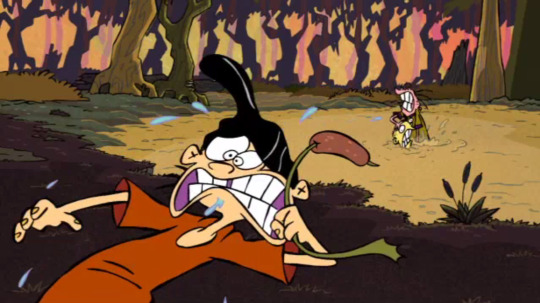
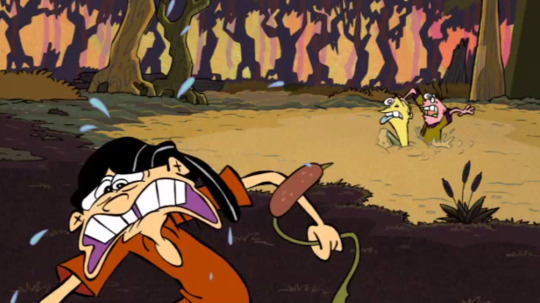
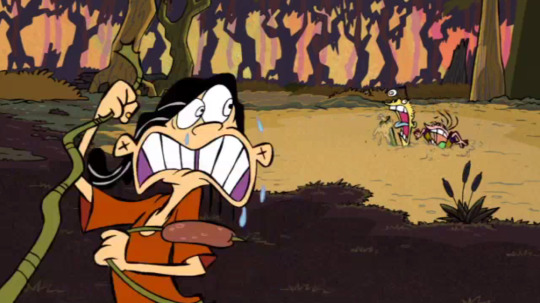

Ed and Eddy dragging each other to their deaths, their voices fading out in the background, while Edd frantically races in the foreground to do what’s best for them. Eddy really could not have set up a prank that conveyed the cracks in their friendship more VISUALLY, could he?

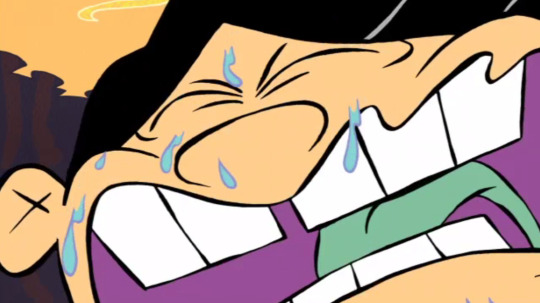
Suffocating close-ups. This anxiety is drowning Edd more than Ed and Eddy are drowning themselves!

Like tightening a noose, right, Edd?
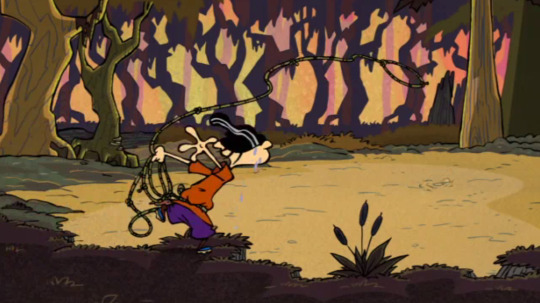
BTW, don’t forget the significance of nooses to Bro, and by extension, Eddy!

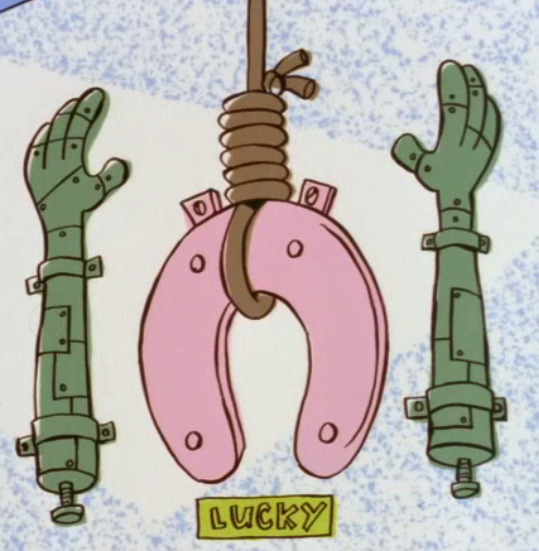
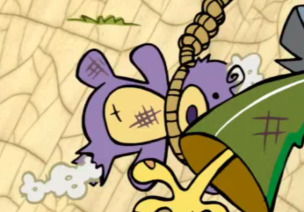

So, seriously, what’s causing the bubbles here? Are Ed and Eddy waiting out this prank with no oxygen or are they back in the bushes or something?

I’d like to mention how much I appreciate the subtle gritty spraypainty detail on the coloring of the quicksand, it definitely helps create the illusion that this may be more threatening than the show’s usual grimy environments.
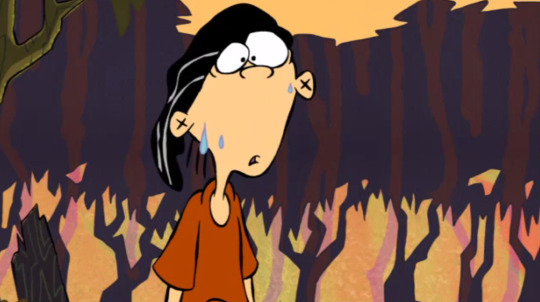
Today on Ed, Edd n Eddy, Double Dee processes the existential horror of accidental death!
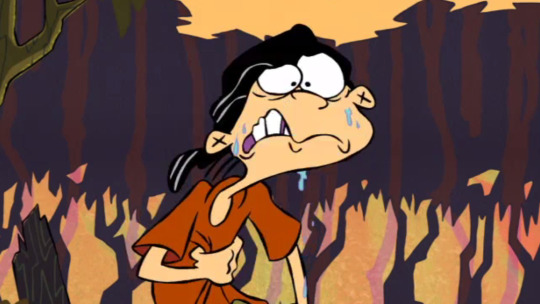
“No.” Edd clutches his heart and attempts to restrain himself.
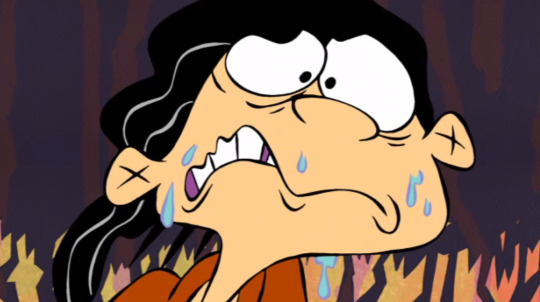
OOOH, good expression matching between shots!!!
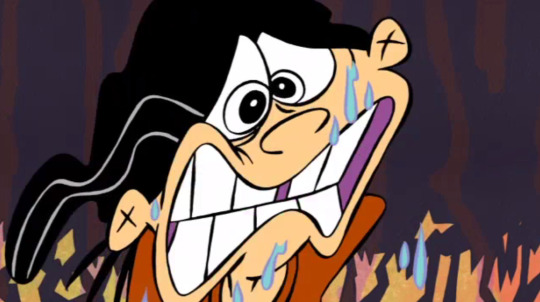
“No!”
This is such a goddamn sweaty movie.
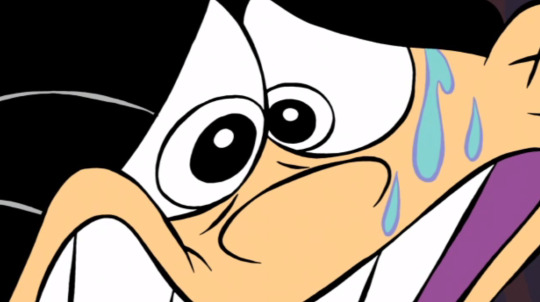
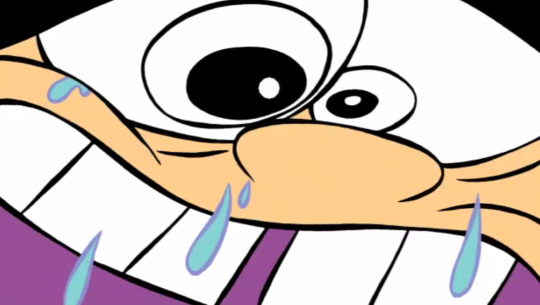
“NO!!!!”

The very first frame of the next shot is Edd already digging and slathered in mud. The urgency with which he throws away his germ phobia to save his friends makes his leap into the quicksand so fast it cannot be caught on film.
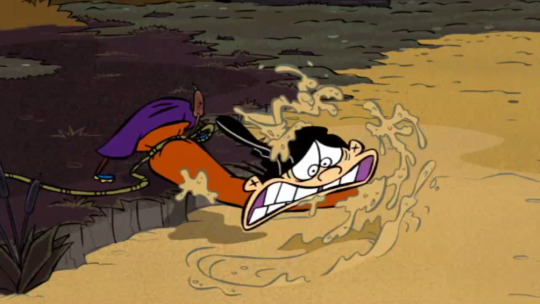
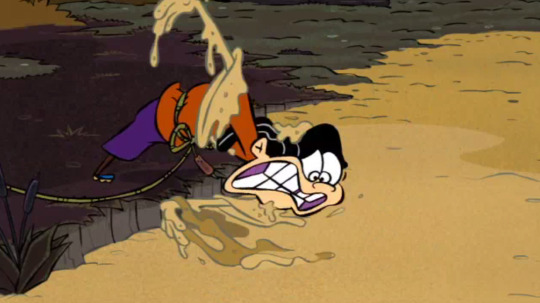

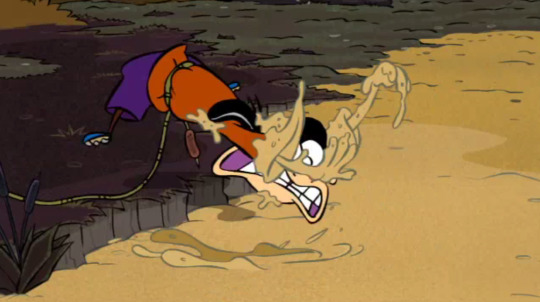
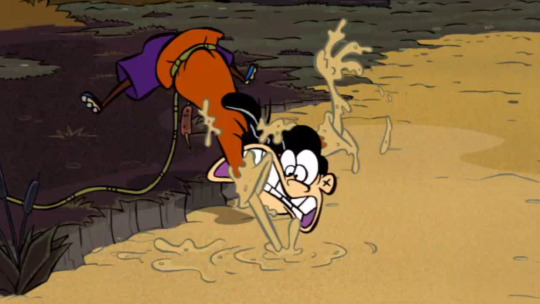
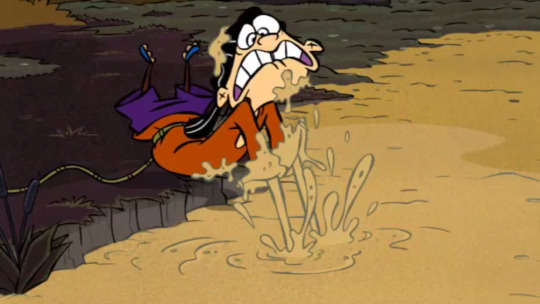
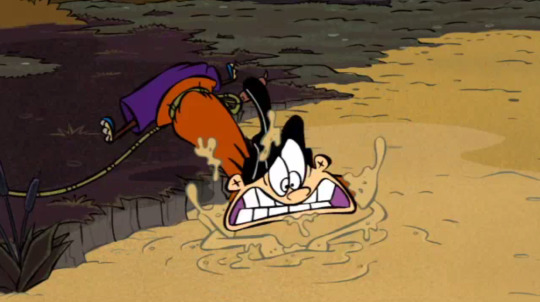

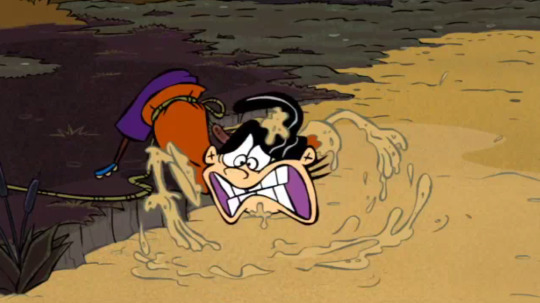
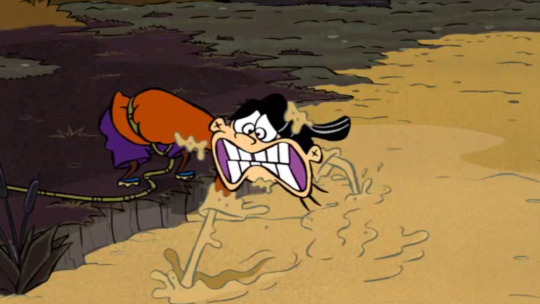

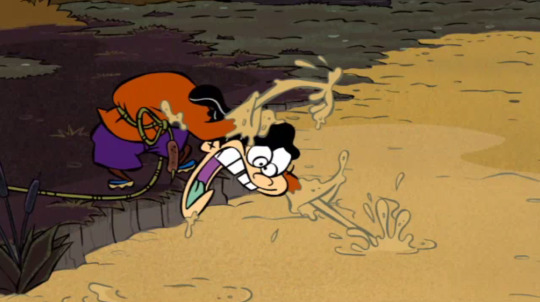
I love that the movie does not overstate Edd’s germ phobia and instead lets the grotesque thickness of this mud’s animation speak for itself. Nobody would want to start wading in anything this gloppy, but Edd does it with so much energy, he is not kidding about how much he does not want Ed or Eddy to die no matter how they’ve mistreated each other in the past year.


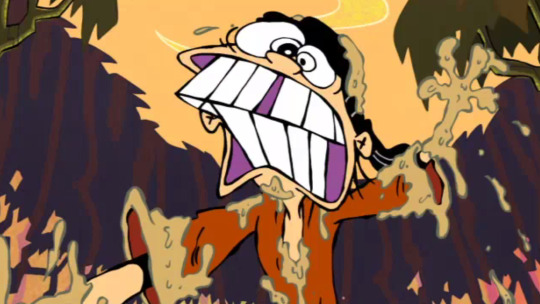

OOH THEY FORGOT TO LINE SOME TEETH!!!
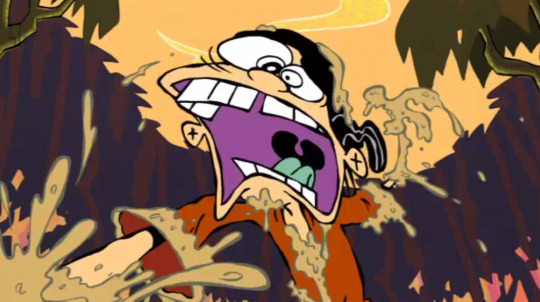
ah there they are

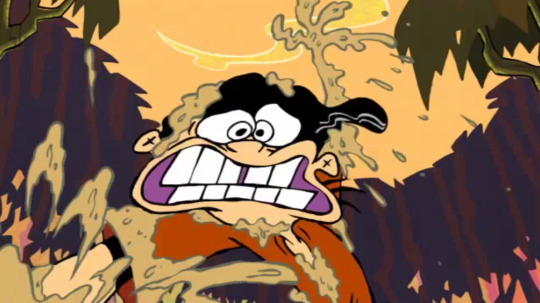
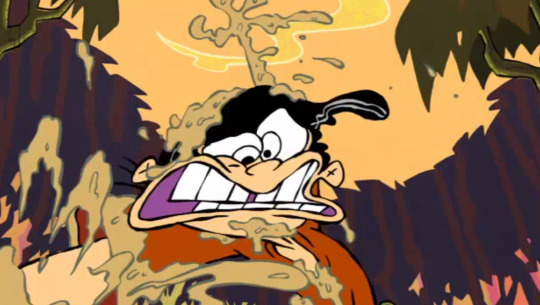

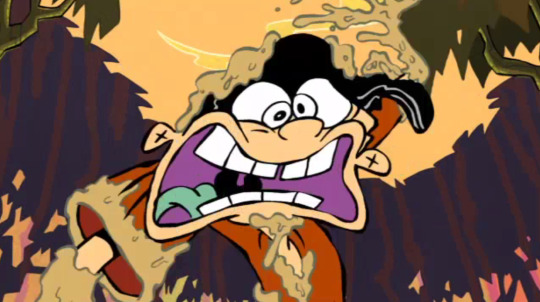

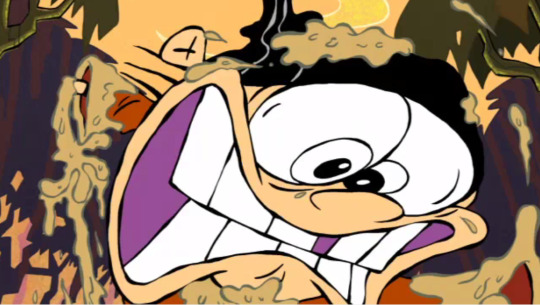


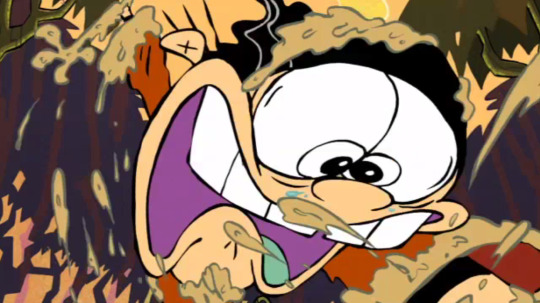
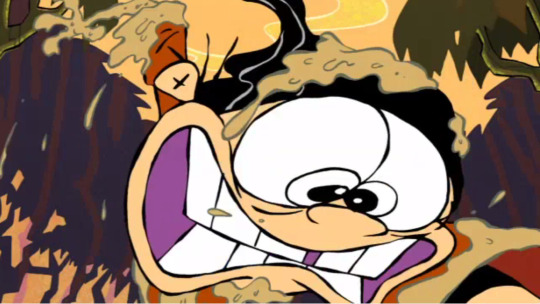

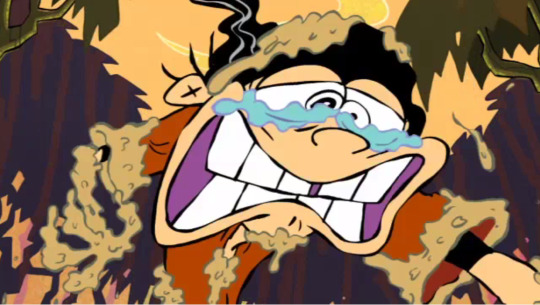
The first frame of Edd crying in this scene and the tears are already down his cheeks! He’s sprung a leak now.
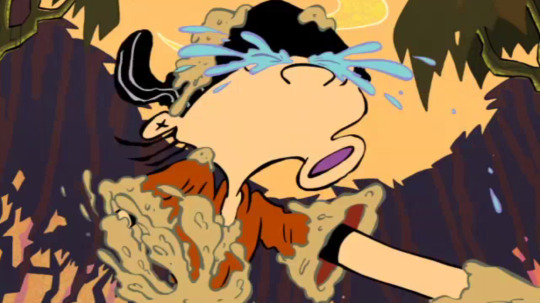
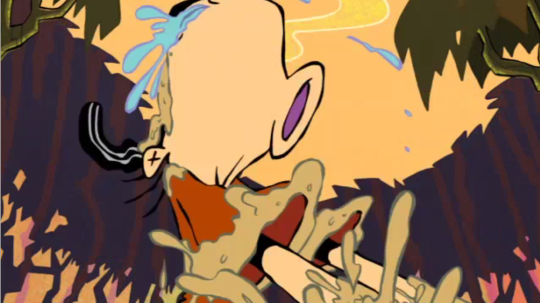

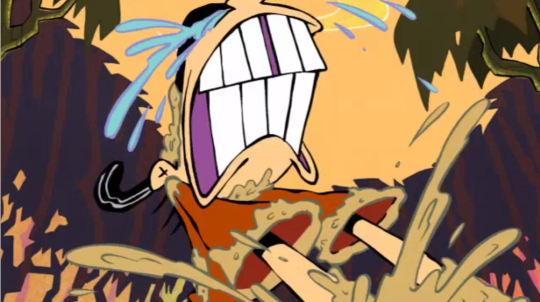

Edd demands to know where Ed and Eddy are.

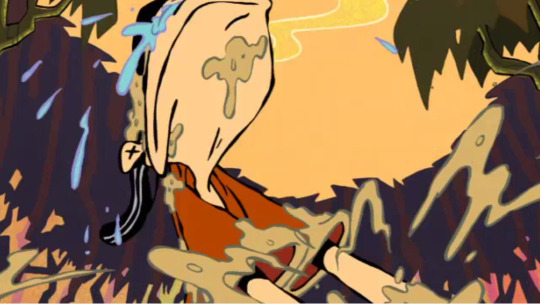

AND WE’VE STRUCK GOLD WITH THIS FRAME-BY-FRAME ANALYSIS
to be clear I am skipping some frames. sorry there isn’t more commentary but i think this glorious ugly-crying speaks for itself.
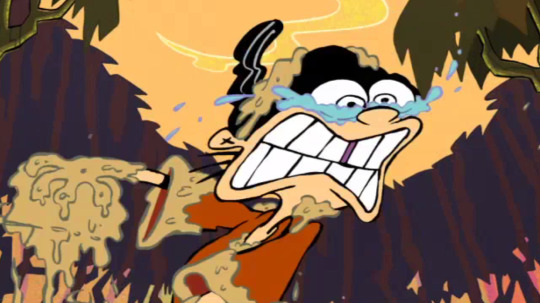

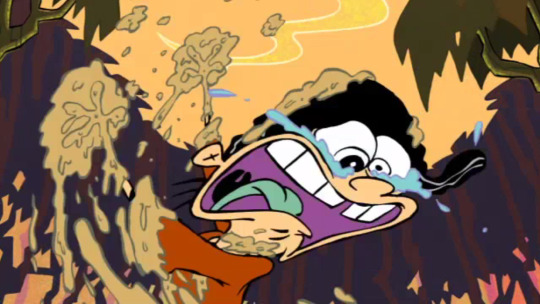
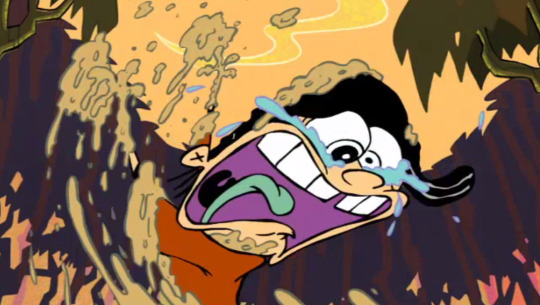
Edd begs them not to give up on him, the survivor’s guilt coming out full force.
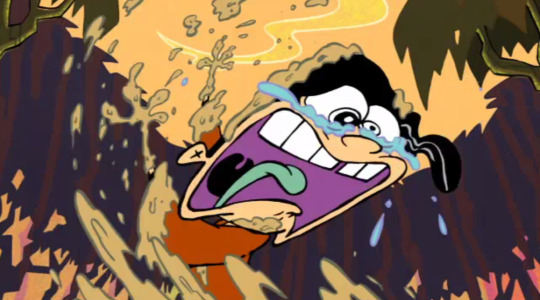

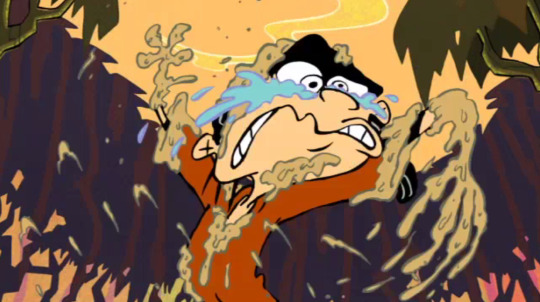



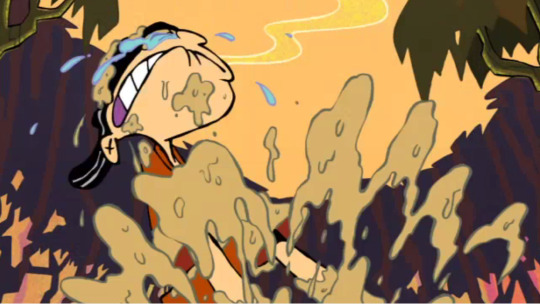
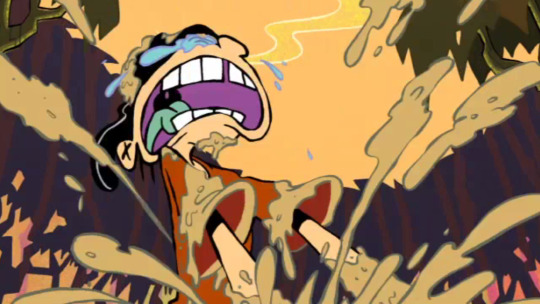
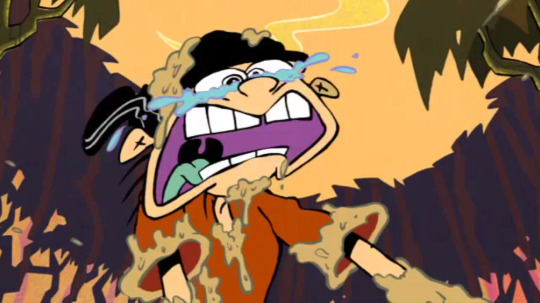


“ANSWER ME!”



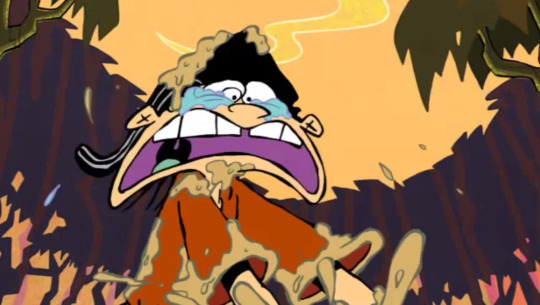
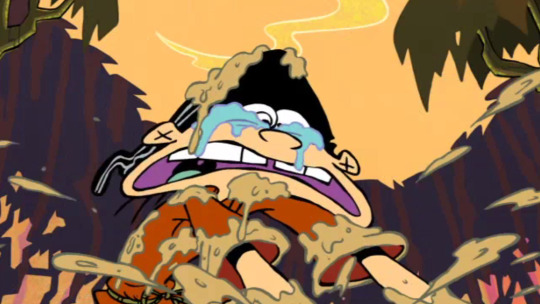
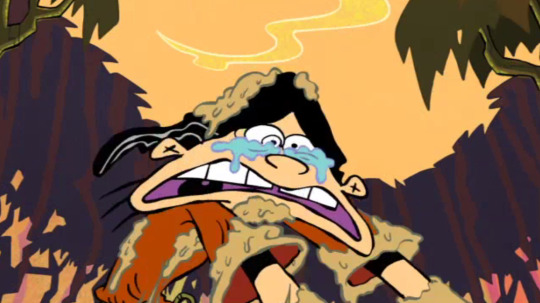
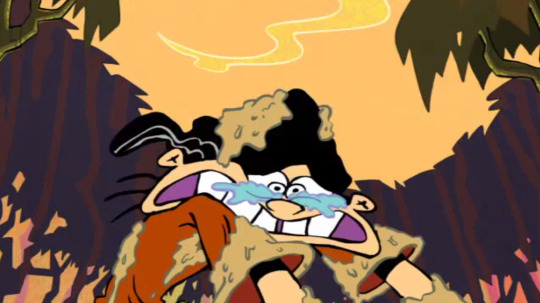


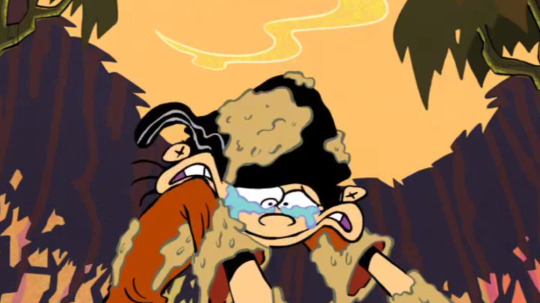
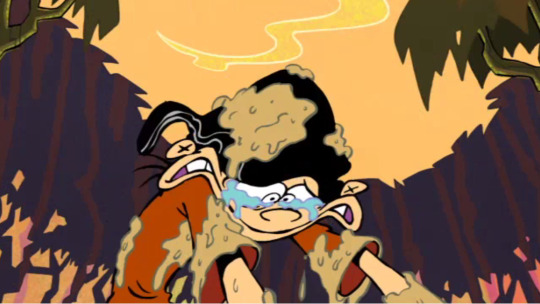
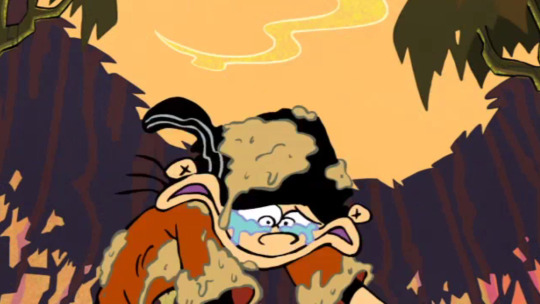
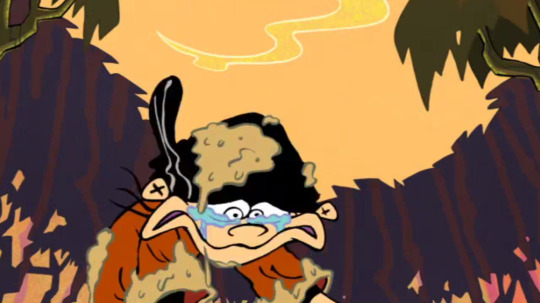

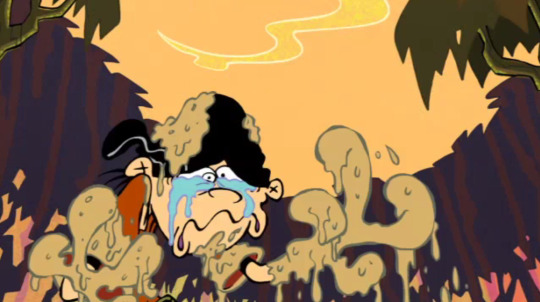
Edd whimpering after “...please...” is the part of this scene that breaks my heart the most. That quiet acceptance that death is real, even in the Eds’ static world, definitely hits on the pain of losing someone close to you for the first time, a note that’s really important to land when this is so obviously (to the audience) a prank.

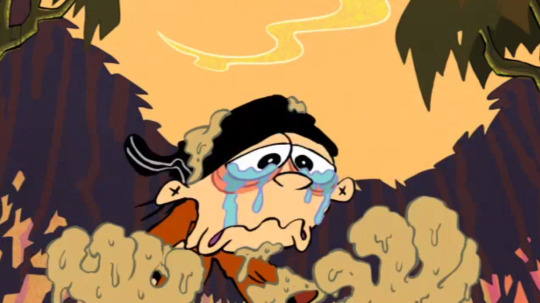

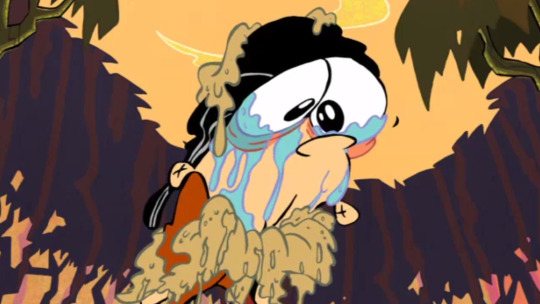
The tear animation on this particular expression is REALLY smooth. Some of the dripping loops are kinda choppy but this one looks great, I love the touch with the darker eyelid skin being colored differently through the tears. It’s a perfect capper to a shot full of really incredible Edd drawings.

Again I’d like to point out that Edd’s perspective keeps switching between claustrophobic close-ups and devastating isolation.
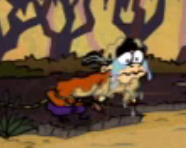

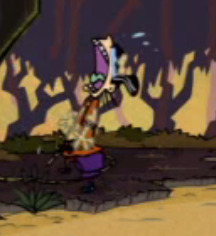

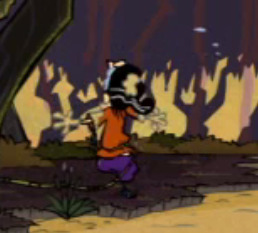

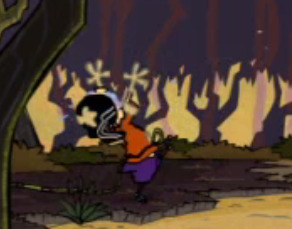
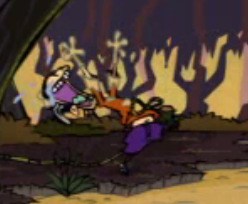
I love how he SCREAMS and stomps around in a circle!
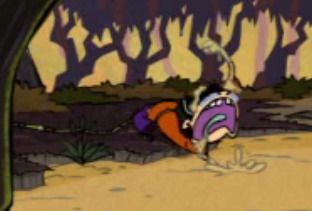
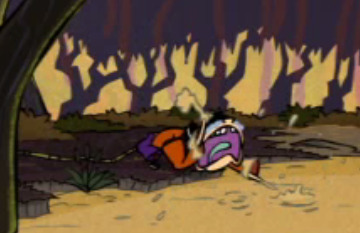
A little foreshadowing of the physical violence he’s going to bestow upon Eddy when they fight after the prank is revealed...
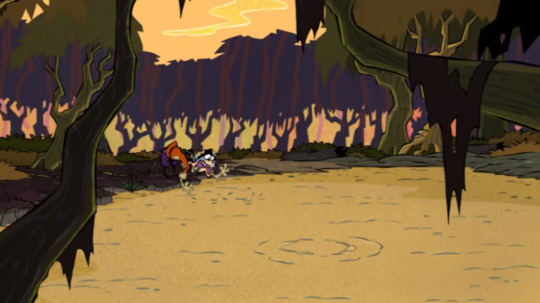
“WHY OH WHY DIDN’T YOU LISTEN TO ME!?”
I love that I can’t tell if Edd is referring to these swamp antics or the entire show. It feels a little underhanded for Edd to say this stuff out loud at what he believes to be the scene of their deaths, but that sort of darkness is necessary to justify this scene after the prank is revealed. Ed and Eddy don’t exactly deserve a better requiem, at this point they’ve brought almost nothing but despair to all the people they wanted love from, even if that’s not what they intended.
In an ask earlier tonight, I interpreted a line Edd says after this scene that informs why he reacts to their “deaths” this way. I just want to underline that: Ed and Eddy are officially more important to Edd than any member of his family, any acquaintance, anyone he’s ever met. And this is the way they treat him after ruining what little bit of a life he had accumulated through all his mistakes. His reaction to their death and his reaction to them being alive but lying to him have a similar fury behind the expressions, fueled by how much Edd has lost over both the last year and the last 24 hours.
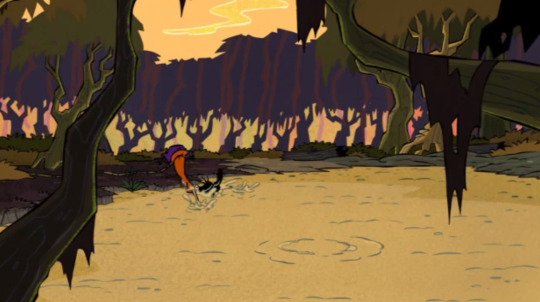
Edd finally faceplants in the mud, to punish himself for failing to steer Ed and Eddy away from their doomed quest, for failing to save their lives, and for insulting them at their graves.
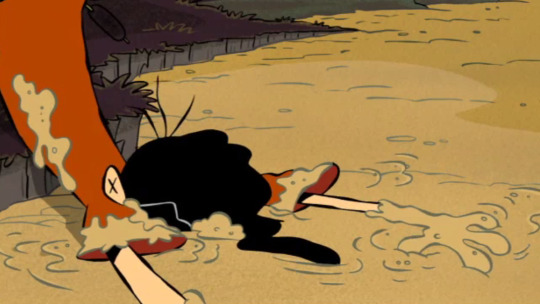
This is the beginning of the last shot of the “Ed and Eddy are dead” sequence, but I want to savor it.

This is the moment where their “death” has finally lingered long enough to feel like the new reality, to Edd as well as the audience. A moment sooner would have rendered it meaningless, and possibly made Ed and Eddy seem nicer or at least more concerned with Edd’s heartbreak, while leaving our thoughts on Edd’s slight about Ed and Eddy ignoring him. Keep the death going too long and it would DEFINITELY feel like a waste. This feels like Ed, Edd n Eddy tugging at heartstrings with the exact balance of sweet and mean that defines the show.
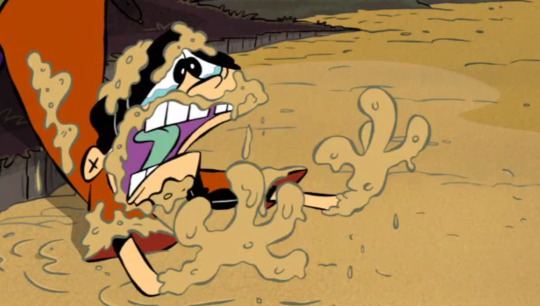

“This is all my fault!”
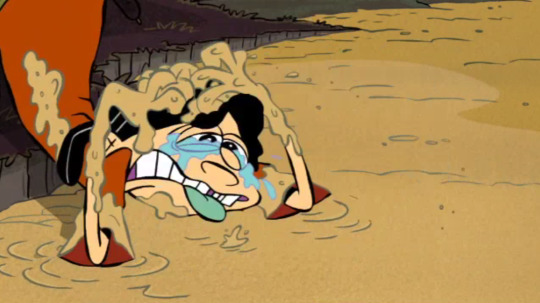



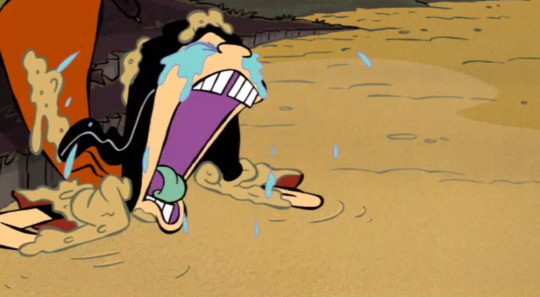
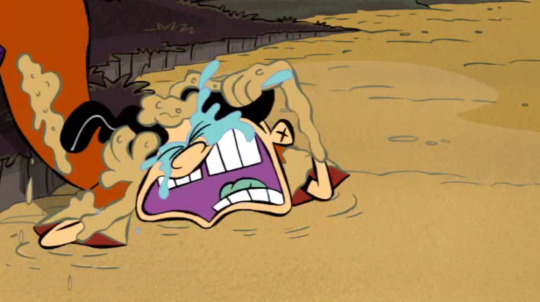

“I should have never let you leave the cul-de-sac!”
I like that Edd’s thoughts would return to “the cul-de-sac” at their death. Even with the traumas we witnessed in Peach Creek, “the cul-de-sac” still sounds like a safe nostalgic place, the natural habitat of the Eds.
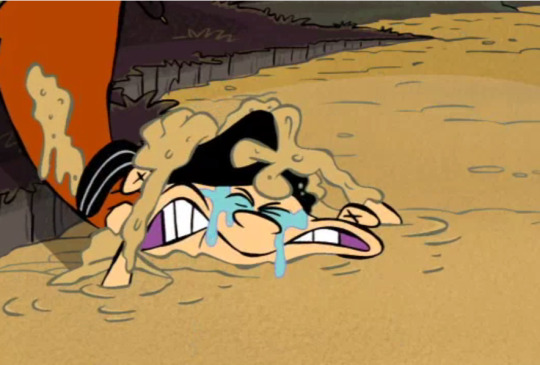
Is that a miscolored sleeve?
This shot was important it because it allowed Edd to show remorse and get more to the heart of what he meant with that slight.
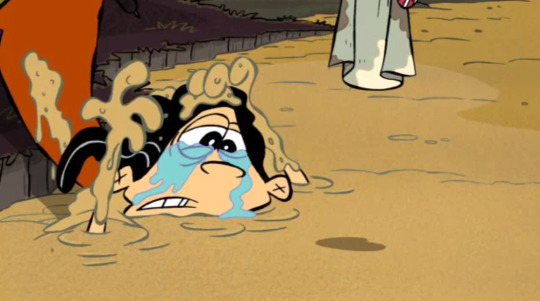
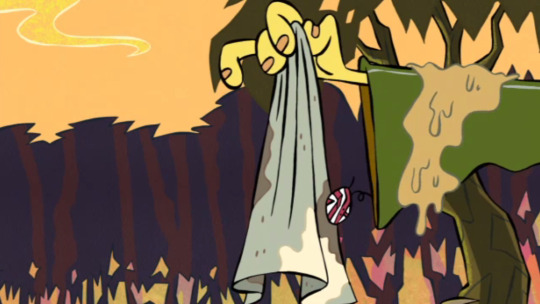

And I think Ed and Eddy quietly offering Edd a tissue is a really good beat to end the death sequence on as well. Mean as they are and as rightfully angry as Edd is, we are still given the sense that they heard what Edd said, and want to return with a semi-caring gesture with a little of Ed’s personality mixed in to help restore normalcy. It’s almost like they are saying “let us laugh right now and we won’t blame you at all for thinking so little of us at our deathbeds.” It is specific and in character. But it doesn’t make up for their actions as much as they think it does.
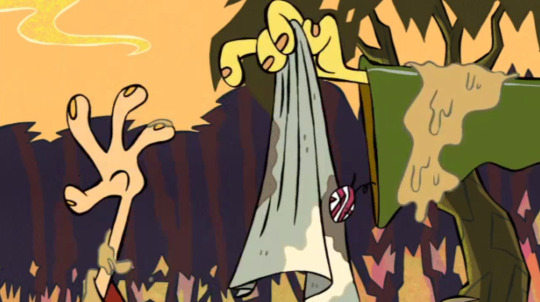
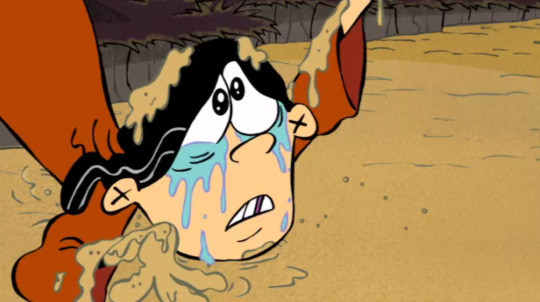
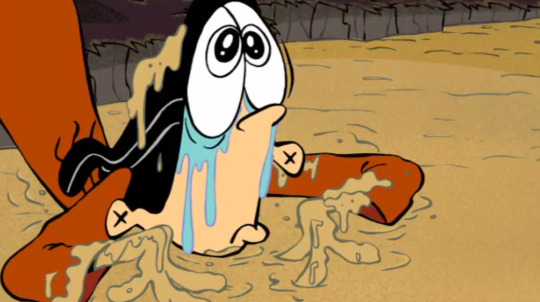
Edd initially complaining about Ed’s gross handkerchief and then drooping as the dots connect that this was a prank is also a pretty well-timed gag.
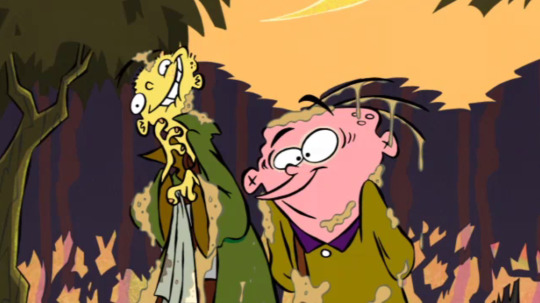
These shit-eating grins, Eddy looks like Norbert Beaver right now with that little beak.
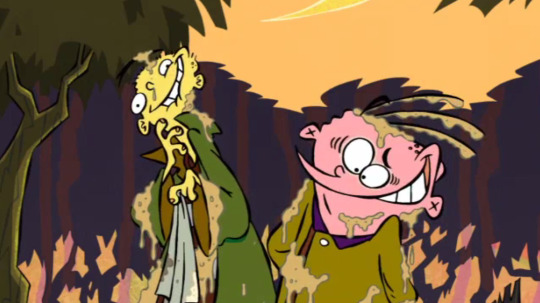

Hmm, Ed’s face doesn’t match between these shots... I wonder if a line got cut out for time here.
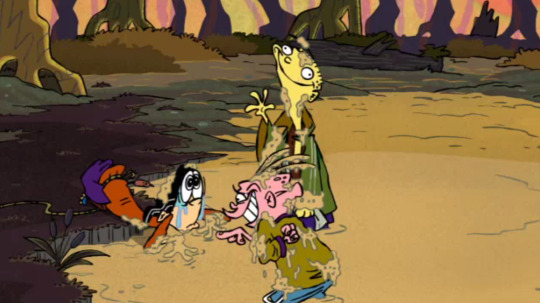

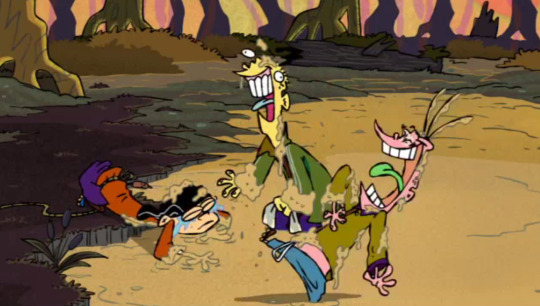
Ridiculing Edd for caring, which probably reflects how little care Ed and Eddy receive from their families and peers.
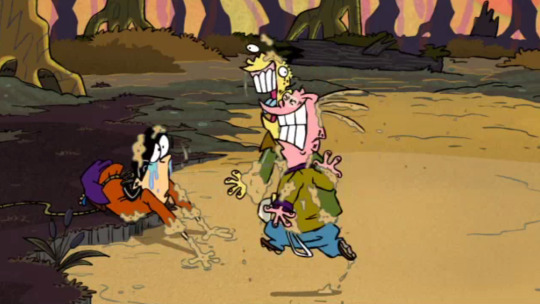

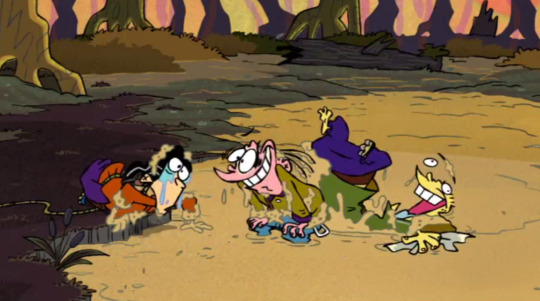
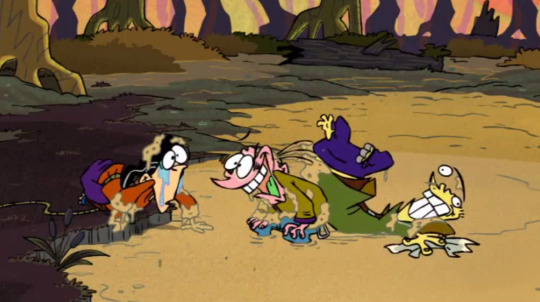
Just like old times, huh Double Dee?
...Maybe too similar to old times...
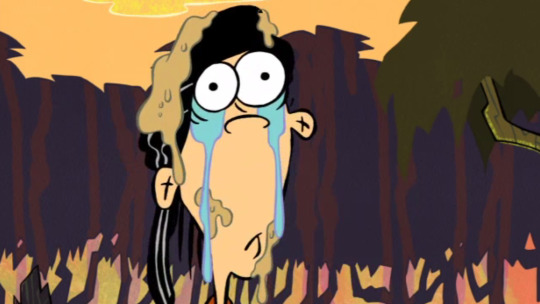
Thousand yard stare while tears stream down his cheeks...
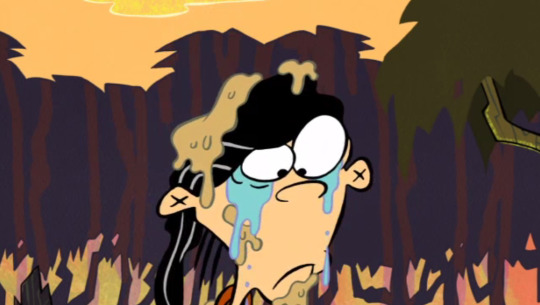
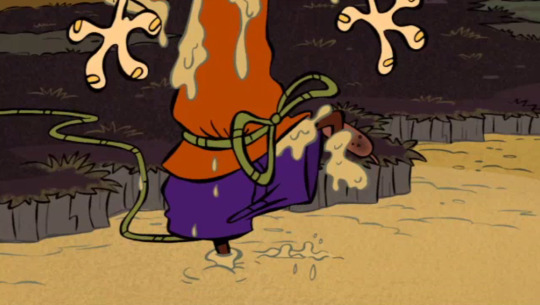
“This muck’s only ankle deep, can’t sink in it!”


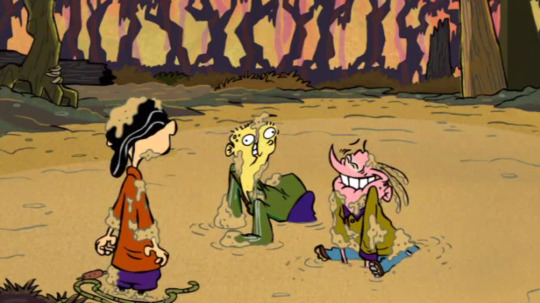
Edd untethers himself. Symbolism.
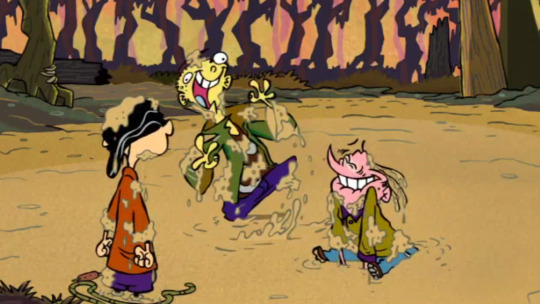
Ed starts making some stupid free-associative response to Eddy’s line.

And Edd spins around and stomps away with stifled anger.

In light of how deeply he just felt about these two, he cannot bring himself to give them the fight they deserve without Eddy dragging it out of him. But Edd can sure as hell walk away.

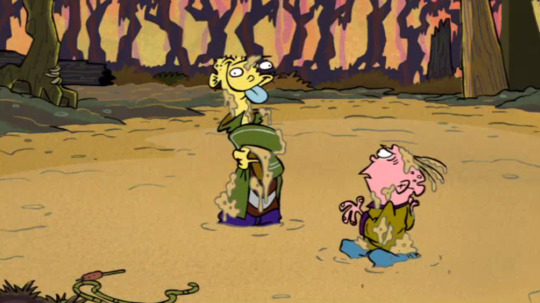


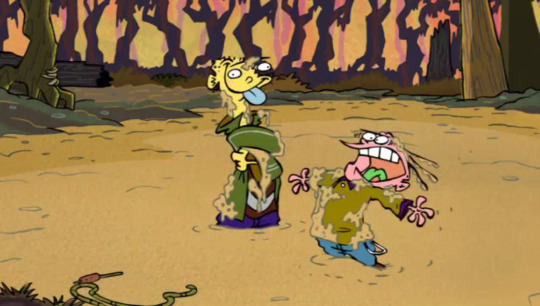
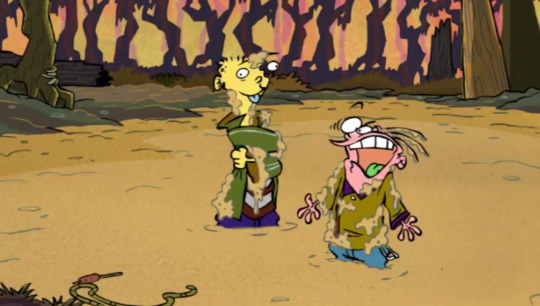

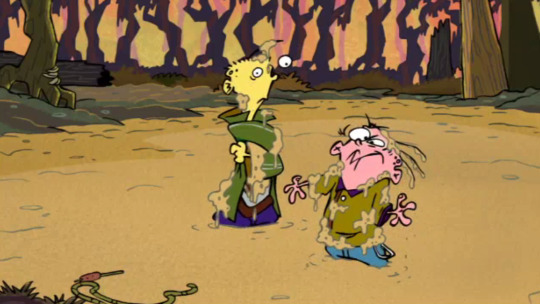
And with that Edd silently quits and Eddy makes a series of strange faces.
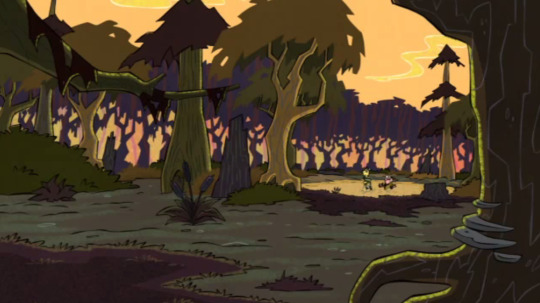
Also in this shot, tiny Eddy’s animation does not sync up with the dialogue at ALL, so I really want to know what line he was animated to...
Anyway, that’s it for this challenge. I hope you enjoyed this mini-analysis grande-screenshot-gallery and have been enjoying these character appreciation months as much as I have! Have a good night.
#Double Dee Weekend Analysis Challenge#double dee appreciation month#ed edd n eddy#ed edd n eddy's big picture show#Big Picture Show#movie#the movie#analysis#double dee#edd#double d
59 notes
·
View notes
Text
5 concepts that can soothe our anxious minds
An unfortunate truth that modern science tells us is- despite our ability of being able to change our cognition, it takes a long time for that change to come in effect. For example- if you’ve been anxious since childhood, a regular meditation practice can and will change your brain, however, for that change to be reflected in behavior, it will take a much longer time.
To some extent, that makes sense. How can years of anxiety (formed by genetics and/or environmental factors) be immediately replaced by serenity through just a couple of years of meditation?
For physiology to reflect on behavior, it takes time and constant practice. Andy Puddicombe, buddhist monk and founder of the meditation app Headspace insists on something in his guided meditations- that, to incorporate mindfulness in our everyday lives, above everything, one needs deliberate practice of labeling distractions, and of course- of meditation.
When things don’t go as planned, its much easier for our brains to fall back on past patterns- its just lesser work. So, if you realize you forgot your wallet in the club, of course you’re going to feel anxious if you’ve been anxious most your life. So,that moment between stimulus (realizing you forgot your wallet) and reaction (panic), your initial reaction, unfortunately, will be guided by your past behavior.
That said, there are concepts we can use to soothe our initial reactions. We can, in a very real sense, use traditional and modern practices to attain serenity.
Note- This post is in no way trying to suggest that meditation is a waste of time. Despite the anxious initial reaction, a serial meditator will be better able to handle the situation better as compared to someone who has never sat in silence to observe her thoughts or feelings.
Concept #1: Love and Kindness Meditation
In the Tim Ferris Show, Sharon Shalzberg, the renowned meditation teacher spoke about loving kindness meditation, a critical component of meditative exercises. During the conversation, to get an idea of what this component entails, Tim shared a story of an exercise he did and the massive impact it had on him.
In it, everyday before winding down, he wished peace and all the love and kindness to two people. As simple as it sounds, he shared how this ridiculously easy habit made him incredibly happy. To uncover this mystery, Sharon shared her insights on the philosophy behind love and kindness meditation.
She stated that our lives are centered around what we pay attention to. Most of the time, the person we’re most attentive about, is us. And our attention, further, shapes our thoughts and feelings. So, for example, if you received a suspicious email from your boss about your performance, the more you pay attention to it, every time you speak to her, everything she says or does will hint you towards that email.
Soon enough, your attention on your problems will color your thoughts and feelings.
Love and kindness meditation helps flip our attention towards other people- that barista who wished you have a good day, or even that dog who licked your fingers as you patted him. Once we start paying attention to others and wish them love and kindness, there is a sense of space that we create for ourselves. We no longer feel trapped by that email. Further, that space we just created helps us deal with our problems. We can finally calm down and think about what we can do in our control to make this situation better.
Additionally, there’s a sense of realization that comes with paying attention to others- that, we’re not the only ones going through problems. We’re all struggling, we’re all trying to make it.
So, the next time you feel extremely anxious about a situation, try to think about two people and wish them all the love and kindness in the world.
Concept #2: Short Assignments
I was introduced to this concept for the first time by Anne Lamott, in her famous book about writing- bird by bird. In that context, short assignments were used to break down complex tasks (like writing a book) to approachable simpler ones- writing the preface (for example).
However, soon enough, I started applying that mindset to everything in life- at work and especially if I was having a shitty day. This helped me approach my daily endeavors in a more realistic manner. It gave me a better picture of what the process looked like- from the overall goal to specific tasks.
Now, how can this help us get serenity?
Think about any situation that can provoke anxiety. Let’s go with the wallet example- imagine its a Friday night, you get back home, ready and tired to hit the bed and suddenly realize that your wallet is nowhere to be found.
More typically, if you’re anything like me, your mind will start imagining the worst case scenarios- your checking account dropping down to zero, someone becoming aware of who you are and where you live, and the list goes on and on. The heart, to make things worse, will feel intense anxiety, making it next to impossible for you to think straight.
Now, let’s apply this concept by asking ourselves a question- how can we break this down? Meaning- to achieve the goal of retrieving wallet, how can I break this down into simpler, more manageable tasks.
I know what you’re thinking- dude, I just lost my fucking wallet. You think I’m going to be in the right mindset to “break this down”?
And you’re right- its really hard to do rationalize when anxiety is at its peak. However, the first thing you’re likely to do is go back to that bar and look for it. Great- that’s the first step in the process. On your way to the club, this concept helps us simply jot down contingency steps. That is- what can you do if you cannot find your wallet?
Well, the first thing you can do is go to your banking app and lock your cards. So, your worst fear of someone taking all your money is taken care of. Next, if you don’t end up finding your wallet at the bar, you can go to the police to file a report- so you don’t have to worry about identity theft.
The point is, when we want to accomplish something that is partially outside our control, we need to, in a very real sense, try our best to break down our efforts into manageable chunks.
As long as we take care of things in our control, we can feel rest assured that we did everything in our power.
The rest, as Marcus Aurelius says- take it as it comes.
Concept #3 Circle of Control
Our lives today, for most part, are intertwined with those of others.
To survive and thrive in the competition that is capitalism, we need to rely on other people and their talents. It doesn’t matter how great your idea looks on paper, to build a prototype, you need to make sure your design department has sufficient bandwidth that week.
And although this gives us a pedestal to achieve beyond our wildest dreams, it does have a downside- that, now, more than ever, not everything is in our control.
If we need to get something done, its more likely that we’re going to be dealing with other people.In the midst of chaos, forgetting this can cause us a lot of anxiety. Think about that wallet example again- as much as we’d want all of our cards and money back, unfortunately, it’s beyond our control.
That said, however, what we can definitely do is go look for it, and (if necessary) lock our cards and file a report to avoid other consequences.
Therefore, distinguishing between what is in our control and what’s not, especially when we’re feeling anxious, can help us sustain serenity.
When we focus on things in our control, we’re more likely to be successful at achieving them. We stop wasting precious time worrying about the what- if’s and zero in on making sure we do everything from our end.
That is when, despite being in a bad situation, we can feel peaceful- since, we’ve done everything we could.
Concept #4 View from Above
Another stoic concept, the view from above mindset entails literally looking at the world as a whole and realizing that in the scheme of things, no human life is significant. The point isn’t to take this existentially, instead, it’s to let it act as a gentle reminder that ego, pride, our troubles, if viewed from the top- don’t matter.
Here’s Marcus Aurelius in his journal Meditations:
Constantly reflect on how swiftly all that exists and is coming to be is swept past us and disappears from sight. For substance is like a river in perpetual flow, and its activities are ever changing, and its causes infinite in their variations, and hardly anything at all stands still; and ever at our side is the immeasurable span of the past and the yawning gulf of the future, into which all things vanish away. Then how is he not a fool who in the midst of all this is puffed up with pride, or tormented, or bewails his lot as though his troubles will endure for any great while? (5.23)
There are situations where despite our best efforts, hopes, and intentions, there is nothing we can do to make things better.
You failed a class in senior year, which delays your graduation date. Your parents fight daily and it doesn’t seem like either party is going to make a mature decision. Notice- that, all of these, to a greater extent, are out of your control. There is absolutely nothing you can do, from your end to make situations like these better.
And, it’s rather unfortunate that we’re bothered by things outside of our control. In fact, to some extent, that is what makes us human, doesn’t it? Its the fact that we’re deeply impacted by actions of people who we love.
That said, this concept makes all of this look trivial. It makes us realize that the unfairness that we deal with everyday, and the unfortunate realities that we dread (death, for example) are way beyond us. They have been affecting people for eons, but at the end of the day, all of this chaos doesn’t really matter.
Life, as we all know, does and always will go on.
If you haven’t seen the view from above video, I recommend you check it out here.
Concept #5 Watching your Thoughts and Feelings
Its no surprise that our minds are incredibly fragile.
For example- if someone tells us not to think about something, its more likely that we will think about it.
And typically, the unfortunate myth that most of us live with is that we are our thoughts and feelings. In fact, the French philosopher Rene Descartes is famous for his quote- I think therefore I am. And, if we follow that mindset, every time we think or feel something that is not pleasant, the natural tendency is to walk away from that thought or feeling.
And that’s what creates chaos.
We think we can control our minds without exercising them (hint- meditation).
The way we approach thinking, in reality, has changed over time.
In an episode of Invisibilia (a podcast that discusses invisible forces that control human behavior and shape ideas), host Alix Spiegel and Hanna Rosin discuss the secret history of thought- three approaches of looking at thought, all of which have been influenced by time.
Approach #1: Thoughts have meaning
Approach #2: Thoughts shouldn’t be taken seriously, they should be challenged through reality
Approach #3: Most of our thoughts are nonsense and don’t deserve our attention. By watching them without judgement, we can stop becoming them
Each of these has its own separate story. If you’re interested, I highly recommend listening to the episode.
Now, there’s no point in rejecting any of these approaches. Each one of them can be used in different scenarios. That said, in case of an anxious mind, which approach can help us feel better about our anxiety provoking situations?
Let’s go back to loosing our wallets. In that case, approach #1 would entail we look deep into that scary thought that someone is going to steal all of our money. Approach #2 would demand that we challenge that thought with reality. None of these will help us in that exact moment when all we can feel is our heart beating faster and faster due to anxiety.
Approach #3 would be interesting. This would mean we simply watch our anxious thoughts and feelings without any judgement. This will help us become separated from them, so, we can focus on doing things in our control.
Side Note- Meditation can help you have a better experience if you do end up approaching your thoughts by watching them without any judgement. In fact, one of the best analogies I’ve known about this concept is from the Meditation app Headspace, said by the founder and monk Andy Puddicombe: Watching your thoughts and feelings is like sitting by a busy road and watching the cars. You’re not reacting to them, you’re not judging them. You’re simply watching.
If you’re interested in learning more about Meditation, I recommend you check out this and this post.
Over To You
Its rather unfortunate that today, given the fast paced world, there are many things outside of our control that can provoke our monkey mind. If you’re interested to learn more about that, I recommend you read this book by The School of Life.
That said, having these tools in mind can help us attain serenity when its most needed- during times of chaos.
Seneca said it the best when he commented on the nature of suffering in imagination vs in reality- we suffer more in imagination than in reality.
So, let’s learn to take ourselves less seriously, let’s learn to let self-awareness spearhead our conquest of attaining peace and calm.
0 notes
Text
Give up yer auld life story

I was wondering recently why those Patek Philippe ads for the act of fathers passing on their watches to their sons make me feel that particular type of guttural illness reserved for the most vile, syrupy rot that offends the very core of my being.
Leaving aside any psychoanalytic deep dive you reckon my reaction justifies, I find the ads in question vom-inducing not just for their commodification of the father-son relationship, but also for the existential feeling of illness (akin to that described in Sartre’s La Nausée) they provoke. The kind of feeling brought on when confronted with something that is metaphysically foreign to you and challenges your very being in the world.
Consistently aghast everytime I open Monocle, the Economist or a similarly complacent zine of the centre right, I have never been able to completely put my finger on why this Swiss intergenerational exchange of wealth inspires ontological dread alongside the weltschmerz that is par for the course when confronted with the financialisation of human relationships.
The ontological aspect to my reaction has recently been explained by my realisation that I don’t possess the central characteristic of the human condition that the ad appeals to: narrativity - having a life story, a narrative; the idea that each of us constructs and lives a narrative and this narrative, or life story is us, it is who we are. It is that conception of a person being shoved in my face that makes me feel nauseous, because it is completely foreign to me and, according to Galen Strawson, I’m not alone.
‘He who has a why to live can bear almost any how’
A celebrated agitator of the traditional view of self, Strawson distinguishes between two kinds of people: Narratives and Episodics. Narratives want to make something of their lives. Episodics do not. For Narratives, giving their life a pattern that reflects what they care about, their values, is making something of their life. For Narratives a coherent narrative that adds up to who they are is the thread holding their life together. It is their life.
But not everyone gives their life a pattern. For episodics there is not this kind overarching coherence to things. Experiences come and go, events happen, but they are not replenishing a well of ‘me’ and telling an overall story of a life. There is a certain blindness to the past, or what life experiences have meant to them as a person.
As an episodic I am completely uninterested in the answer to the question of what I have made of my life. I am just alive and this whole accompanying idea of creating a narrative, and a way of describing it to myself and others, has no part of it. What I care about, in so far as I care about this ‘my life’ construct, is how I am now.
Enjoyment culture
Despite Strawson’s useful distinction, the Narrative approach - the idea that there is a story to your life that you are adding to everyday - does seem to be the default view. The advertising industry, and social media in particular (‘enjoyment culture’), has fully grasped this in recent years, and has exploited it with incredible success.
Enjoyment culture has set up a kind of ubermensch within the Narrative framework: a person who enjoys themselves all the time. The corollary being that if your narrative does not resemble this you are failing in life.
To be clear,narrativity in itself is not bad. Indeed Narratives are in good company: Nietzsche, Heidegger, Plato, Keroauc all saw the process of Narrative creation as the fundamental human project. But this coherence, pattern seeking tendency has been made problematic by the annexation of narrativity by modern enjoyment culture as espoused by advertising and social media. Specifically, this move has made disentangling your personal narrative vocabulary from that provided by enjoyment culture, to engage in a true process of self-creation, problematic
Social media and advertisement hark back to the Freudian therapist who operates from a position of knowledge or authority to the patient: it sees us only in relation to a single theory of the human condition, and doesn't ask questions in a genuinely curious, meaningful way, instead only eliciting in what relation our lives stand to a wider theory.
Enjoyment culture makes us into a character in its own version of events, and does not allow us to have different values apart from enjoyment. Its interventions are designed to help us understand ourselves just as the Freudian: as agents that stand in some relation to a preconceived body of theory, or in this case the master signifier of our time: Enjoyment.
For Narratives the antidote to the aggressive seizure of narrativity by enjoyment culture may involve a Socratic approach, similar to what has occurred in the evolution of psychotherapy: an approach which asks questions in order to facilitate a self-generated idiosyncratic narrative, rather than assuming we all want to be enjoying ourselves all the time. I don’t know what this looks like in terms of social media and advertising, but there is a view that these media can deliver us from political psychosis, so why not Narrative psychosis?
0 notes
Text
Cathedrals Interview
Brodie Jenkins & Johnny Hwin
Photo by Casey Catelli
San Francisco based duo Cathedrals are back with more infectious indie-electro gems as the duo ready their long-awaited album. Johnny Hwin constantly impresses with his distinct electronic sensibility, alongside a vault of tracks and an endless string of ideas, whilst his creative partner Brodie Jenkins, a soulful crooner with folk roots adds a captivating voice and delicate lyrics to the mix. Continuing to reach new listeners, the duo explores new themes and styles to further their impressive development, all the while displaying meticulous care and intricacy with their stellar output… We talk to Brodie and Johnny about personal subject matter, Star Wars and downtime…
TSH: How would you assess your working dynamic as you were readying new material?
Brodie: We were both in this introspective space and dealing with our own personal lives. I was actually getting married at the time of writing this new record and Johnny was going through some turmoil in his love life, so that's where we were mainly drawing from. The music we ended up with is interesting to me because given all the intensity in our lives; it's quite a joyful album. Also, I feel we were both coming up for air after having this dark cloud over us with our country's current state, which has been difficult to see. For both of us, music has very much been the outlet and escape during recent tough times.
TSH: Does vibing off of one another help you to excel?
Johnny: Yeah, I think so. Our process consists of us coming together and discussing a lot of different things that we've been working on. Personally, as an artist, I've always had a struggle with finishing music. It wasn't until I met Brodie that I got over this struggle by having another creative partner. It's cool that the music on this new album is a reflection of our personal lives and very real experiences. I find it very pleasing when we bring music together because this unique combination of our diverse experiences tends to come into play.
TSH: What's been the most notable shift in instrumentation since the release of the EP?
Johnny: One of the biggest things that happened to us after the EP was being able to take all of the songs that we had written and recontextualising them in a live context. We were quite literally forced to play the music live. The first EP was mainly written on a laptop with lots of electronic bits. However, when we toured in support of our EP we brought in a couple amazing live musicians, including a drummer and bass player. Eventually the four of us got together and started jamming out and we suddenly had music concentrated within a live context, which really informed the recording of the new record.
TSH: Brodie, how do you normally decide on your vocal stance?
Brodie: Well, sometimes Johnny will come up with a song and he'll give me an idea of what he's imagining and then I kind of start singing his idea and we'll come up with a tonality and approach to match Johnny's vision, if that makes sense, ha! Also, if I come up with a song by myself, I'll typically have a way that I sing it when I first record it, usually that's the magic, and I look to recapture that original essence. The hardest part is going to into the studio after you've brainstormed an idea and trying to get back to how it sounded, often it's just gibberish and I'm left trying to form lyrics over gibberish vocals, ha! However, just combining all of our ideas definitely helps me to realise how to impact my vocals more consistently.
TSH: What intentions did you outline with 'Try to Fight'?
Brodie: I feel that when I wrote the chorus for this song, I had like a really high energy and pop inspired song in mind, but it wasn't until Johnny had given me his instrumentation that we were really given a sense of direction. The track has a little bit of an 80s vibe but it's still very firmly rooted in a modern outcome and has a very Johnny Hwin type of production style.
TSH: Does 'Don't Act Like A Stranger' entail a sense of hopefulness and resiliency?
Brodie: Yeah, totally. It's interesting when you listen to the song; you think it's a happy song, especially when you're not paying attention to the lyrics. The song has a buoyancy and uplifting quality to it, but the lyrics are pretty rooted in sadness. We tried to embed into the delivery of the vocals and the whole production this type of possibility and strength, and so I hope that that comes across.
TSH: What matters most when you perform live?
Brodie: A huge part of it for us is to make it as live as possible. When we wrote our first EP, we started in a studio and we added organic instruments later, so it was mainly a studio process. However, we were really opened up by playing live; this is what created a whole different type of world for us in terms of possibilities. With other musicians supporting us in the studio, we’ve been able to go to the next level and it's made the whole album feel more alive. We want to sound like a rock band when we play live, in the vein of Led Zeppelin and Fleetwood Mac. I don't enjoy watching two people on a laptop, it’s just not my favourite show to watch, so our main goal is to make this is as live, raw and organic possible.
TSH: Do you still gravitate towards gothic novels?
Brodie: Ha, you know about that. I am a crazy Brontë gothic novel freak and I can be a little bit morbid with my literature taste, haha! I just love to read and whenever I’m writing lyrics these types of novels always find a way into my music, whether it's subconscious or something I'm actually thinking about.
TSH: Johnny, what’s been inspiring you with the music world lately?
Johnny: Well, I’ve been getting back into Elton John and learning how to play a lot of his songs on the piano, just for fun. What's been really inspirational for me, especially on the production side is a lot of what's happening in hip-hop right now, whether it's the new Kendrick album or the new Drake mixtape. Those guys are working with some of the most talented beatmakers out there and there’s just so much to admire, There is a darker filtered out tonality to what's happening in the world of beats with hip-hop right now and it's really inspiring.
TSH: What did you make of Star Wars: Rogue One?
Johnny: I actually loved both of the recent Star Wars movies. A lot of my friends hated that The Force Awakens sort of paid homage to a lot of the original trilogy motifs, but I thought it was great. Also, after watching Rogue One, I thought that was great too. I was stunned at how different their take on Star Wars was and I was so delighted that they were able to make it grittier and darker in this war era, which is kind of how I think of Star Wars.
TSH: What’s downtime like for you both?
Johnny: I have to admit I've been watching a lot of basketball. I actually grew up in the East Bay and I've been a Warrior fan all my life, even when they were one of the worst teams. I like to joke that sport is how I get over my existential angst and dread - via watching balls going into hoops.
Brodie: I guess right now I'm just a boring married person, ha! My husband and I are homebodies. He loves to cook, we have a few cats to chill with and there's a lot of time spent hanging out, reading and snuggling.
TSH: What’s the Cathedrals philosophy as you look ahead?
Johnny: Whenever you're writing music, there’s always a temptation to write a song for a specific outcome or goal, but Brodie and I got into this because as artists we’re so keen on exploring our set of influences growing up and expressing our ideas and feelings through music. A lot of the focus as we grow is on distilling the truth and finding the sort of music inside of us, as opposed to appeasing others…
Brodie: I totally agree. Also, I feel it’s important not to get into a rut and not to stagnate. It's really vital for us to continue to grow and change too, if that means the music changes, then that's okay. We just want to develop our craft honestly and improve as we go along.
Cathedrals - “Don't Act Like a Stranger”
Don't Act Like a Stranger - Single
0 notes